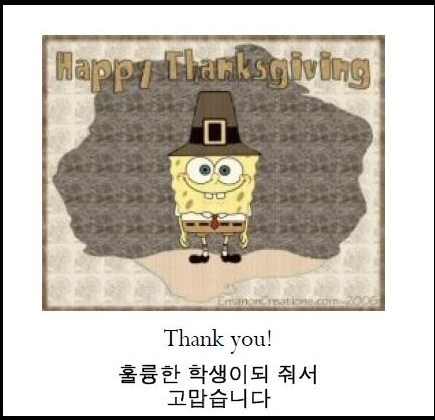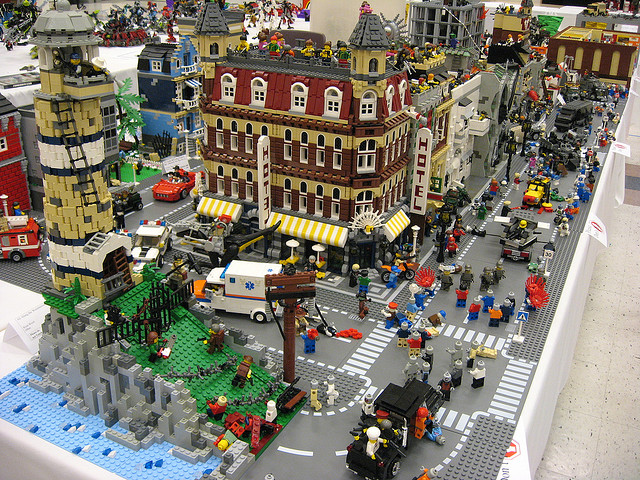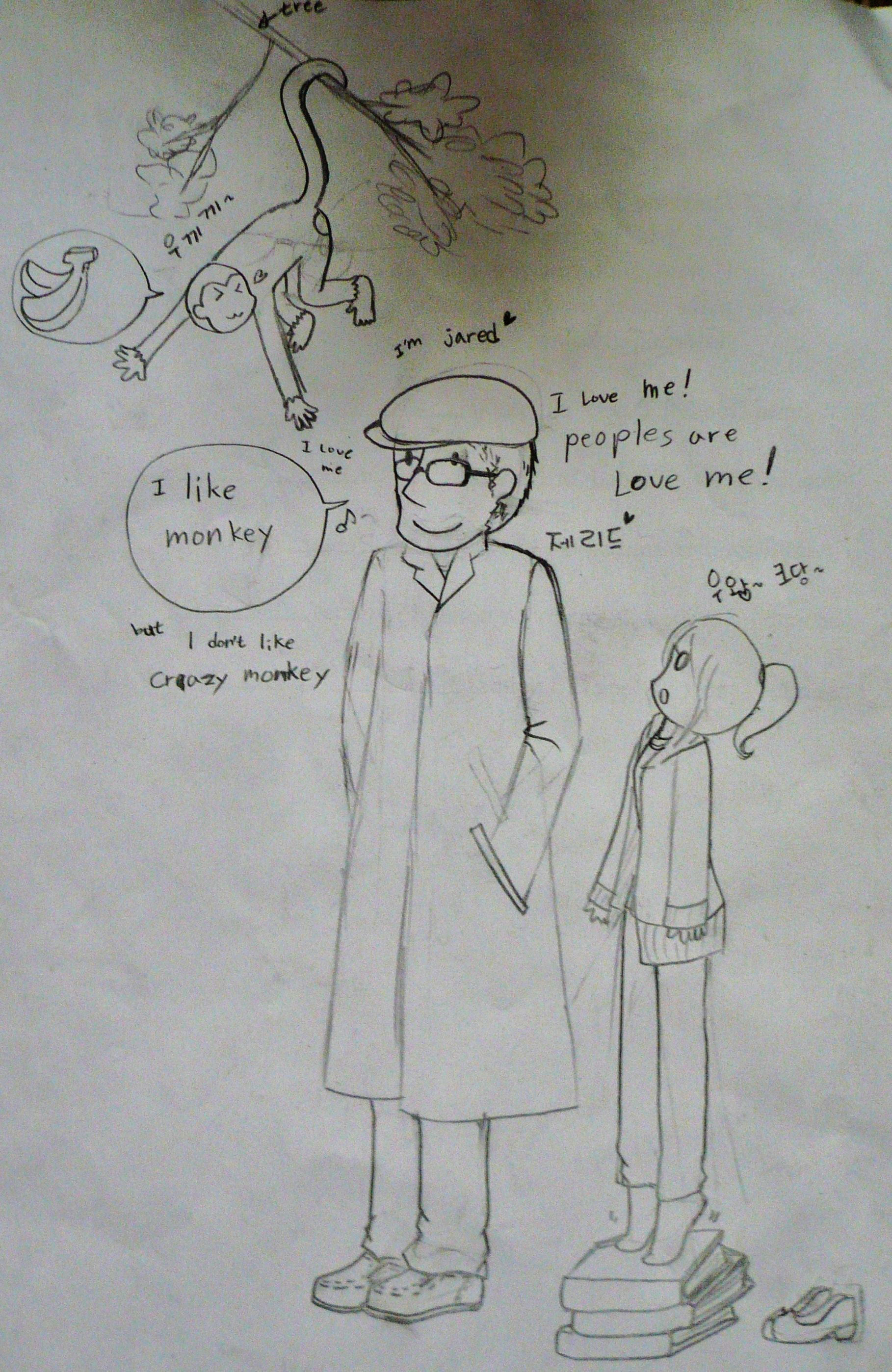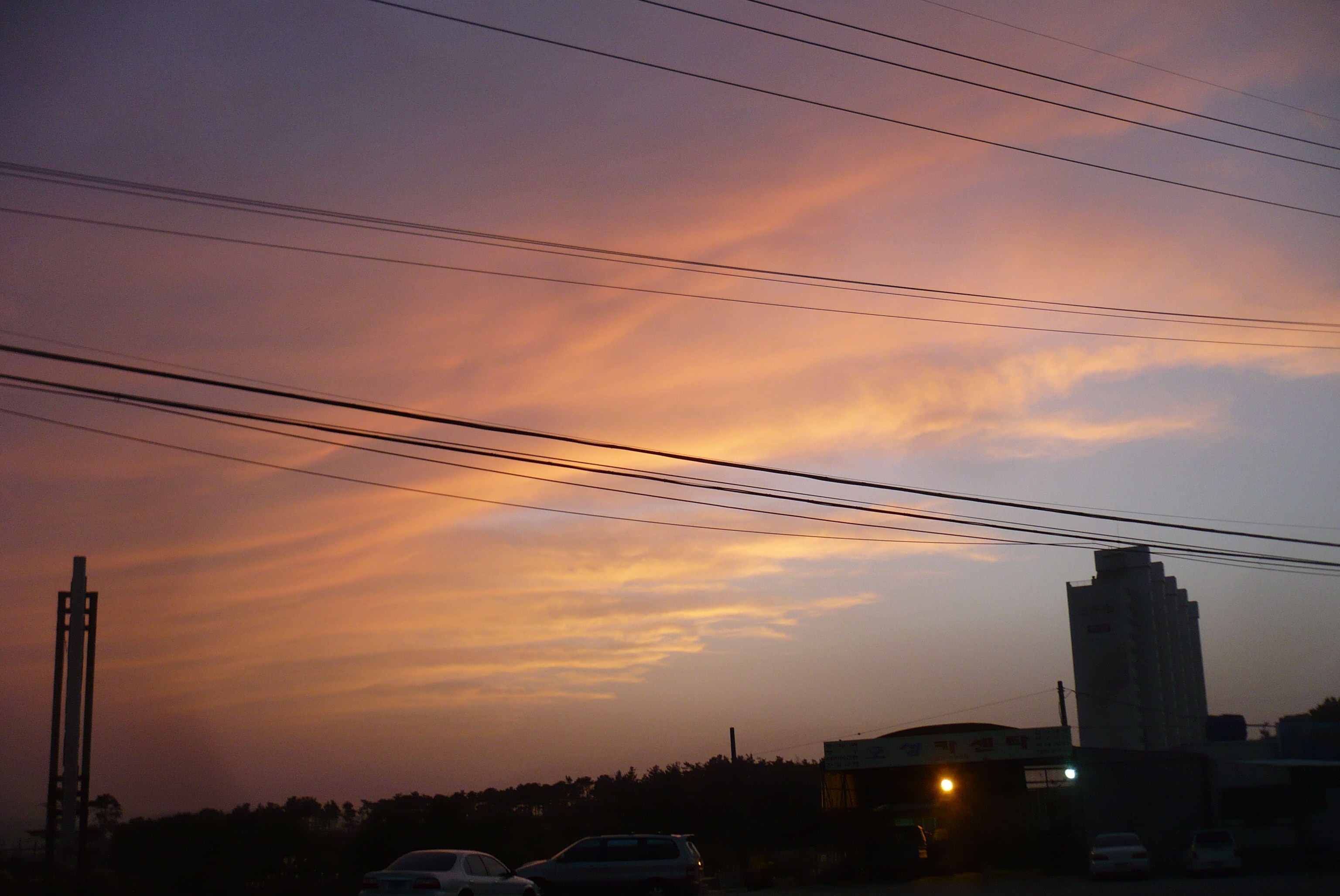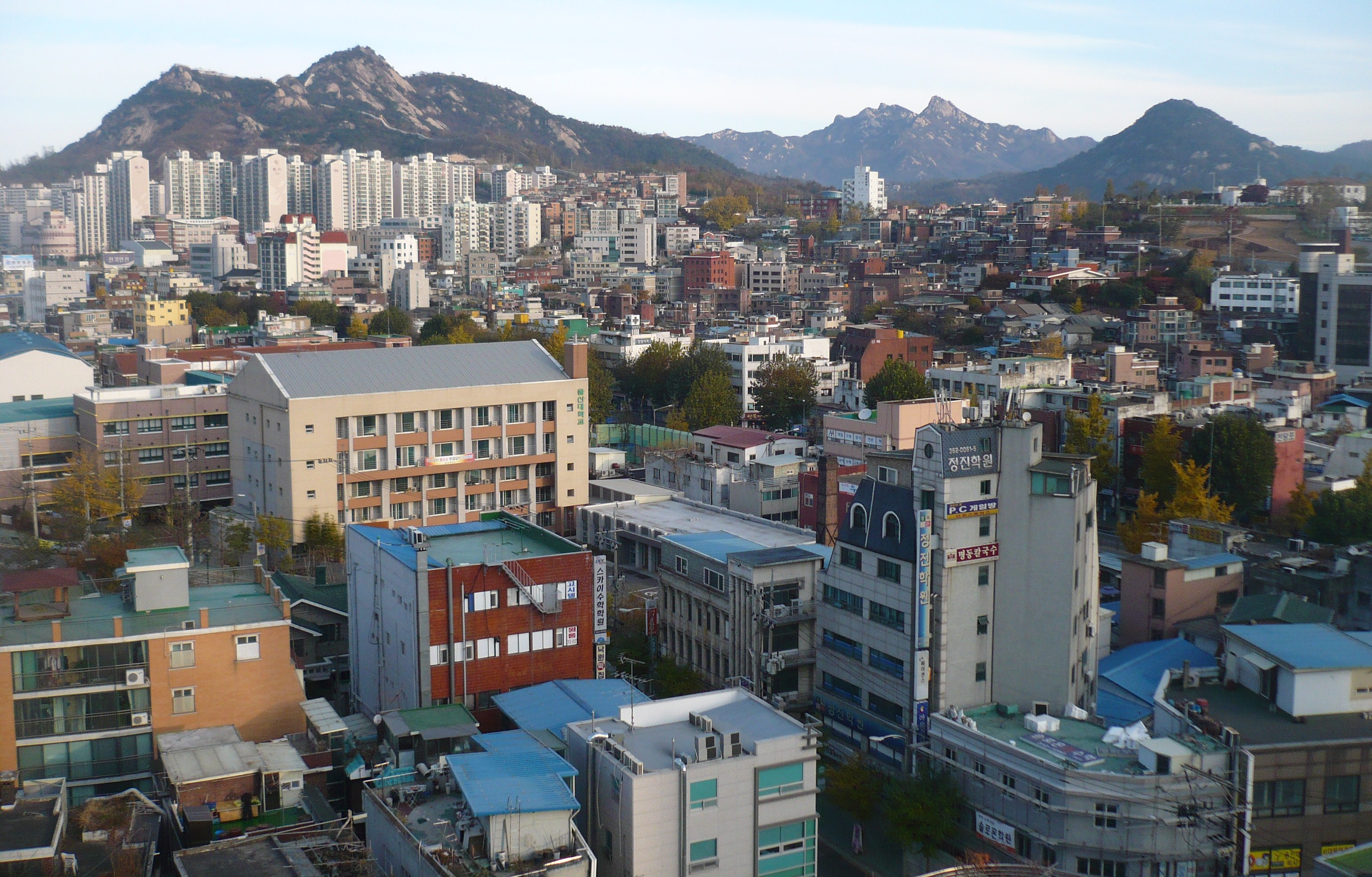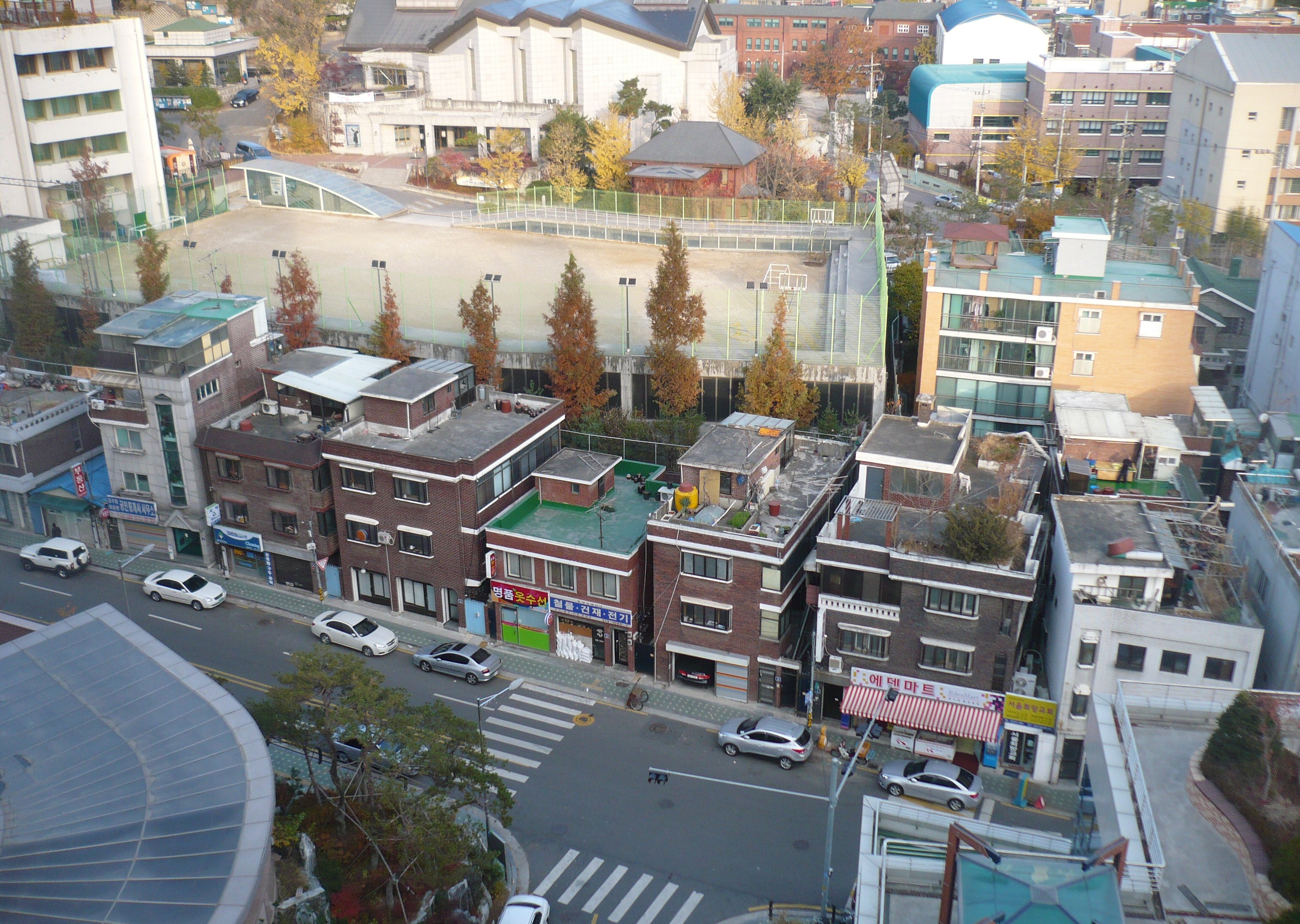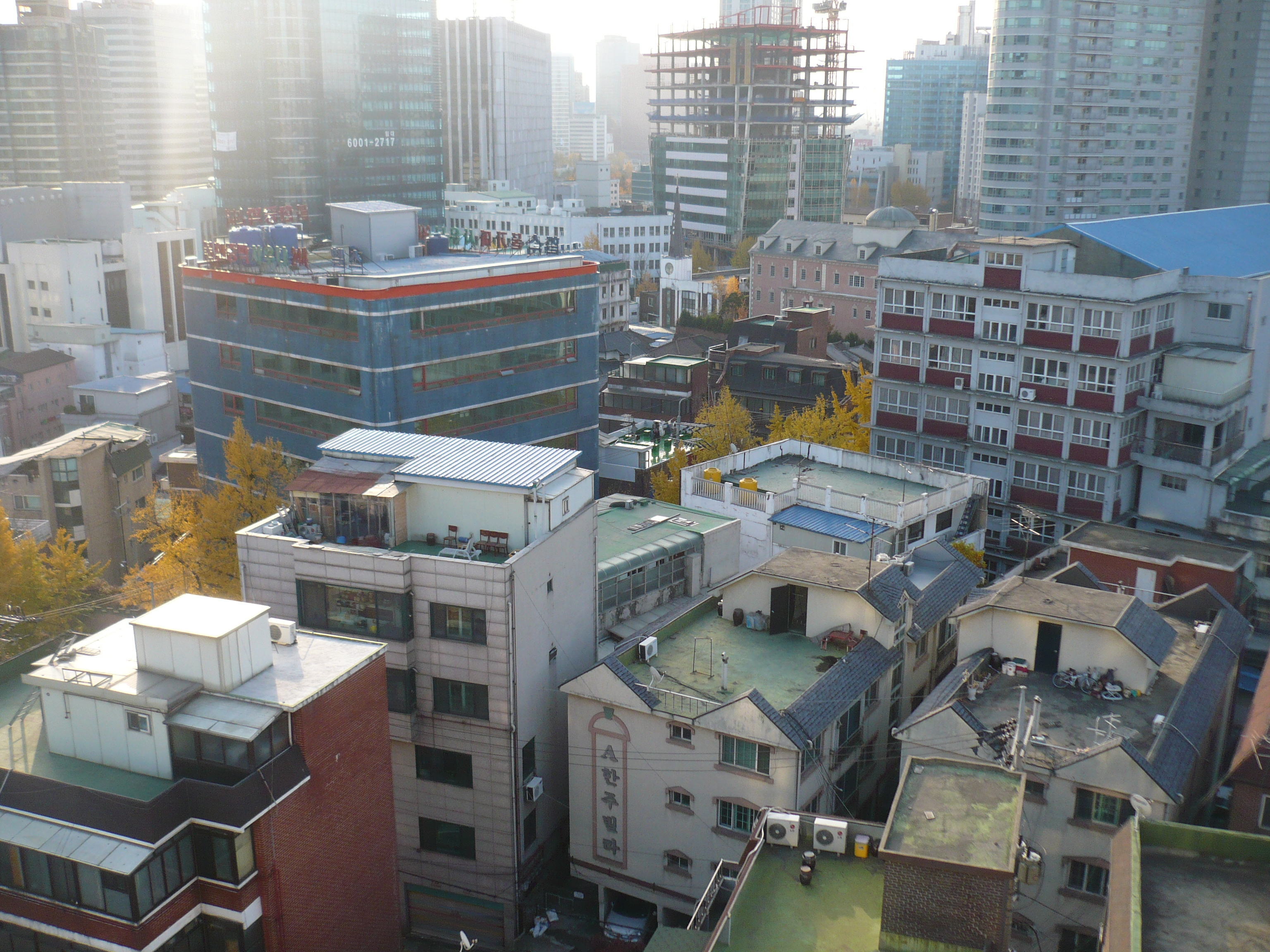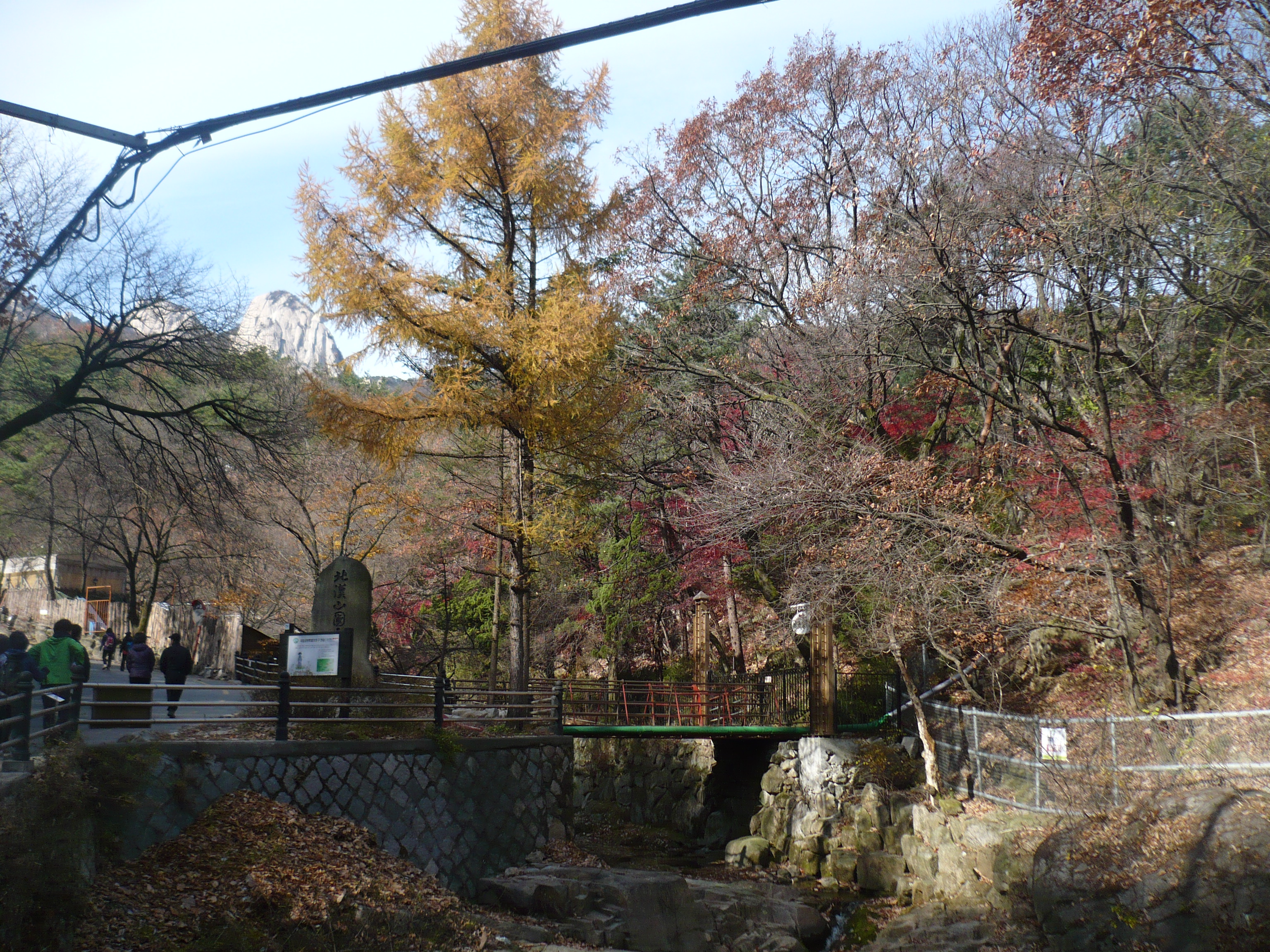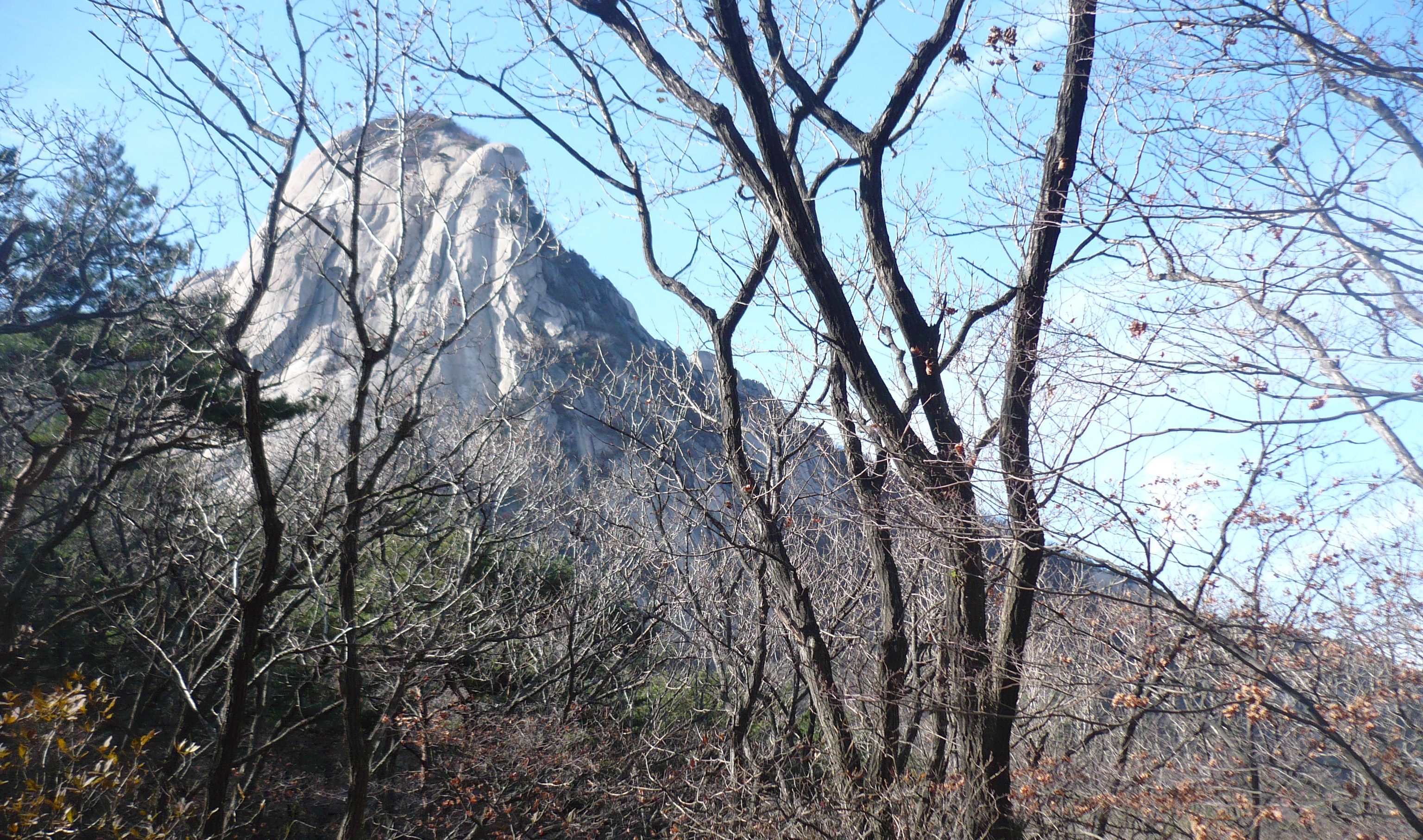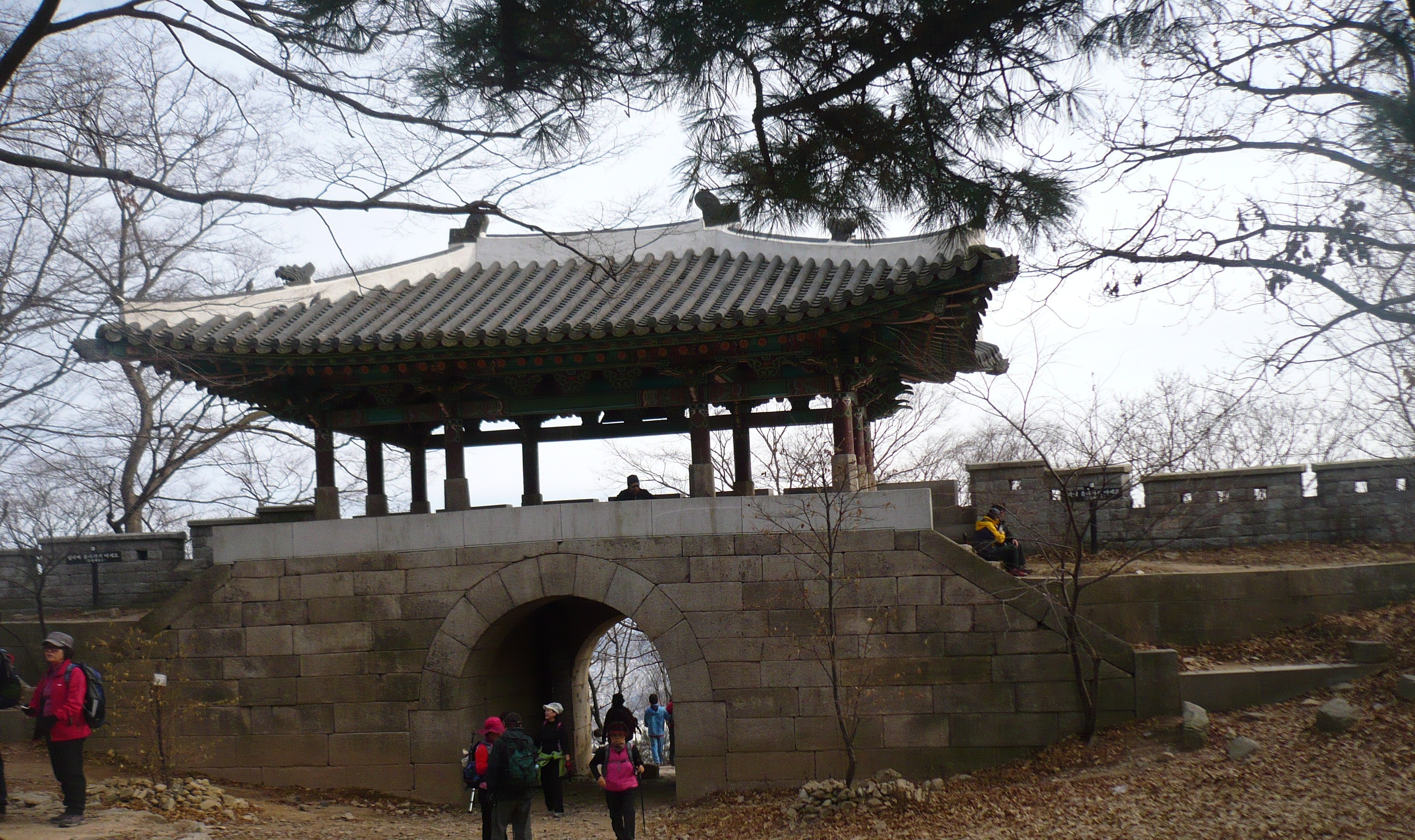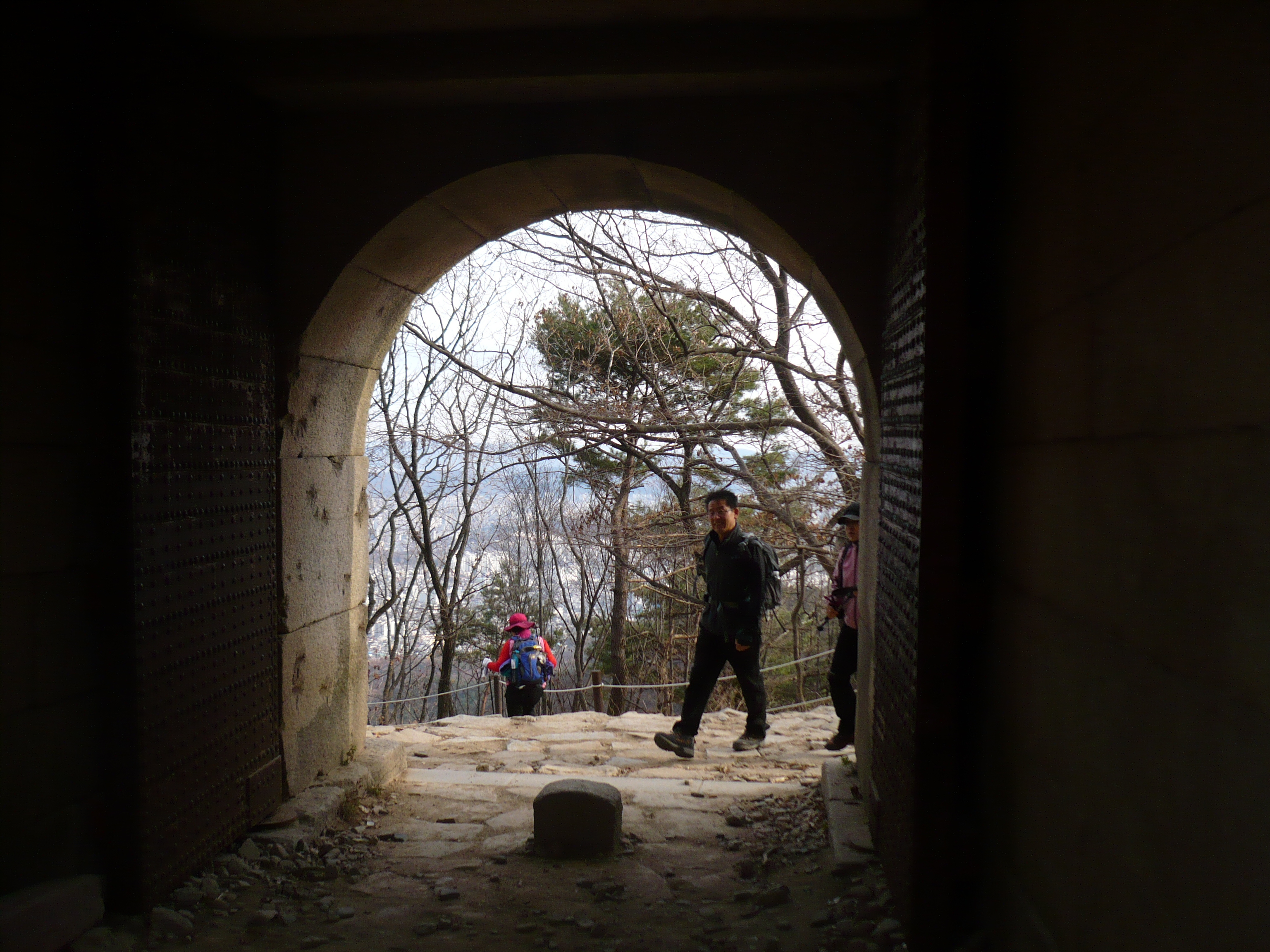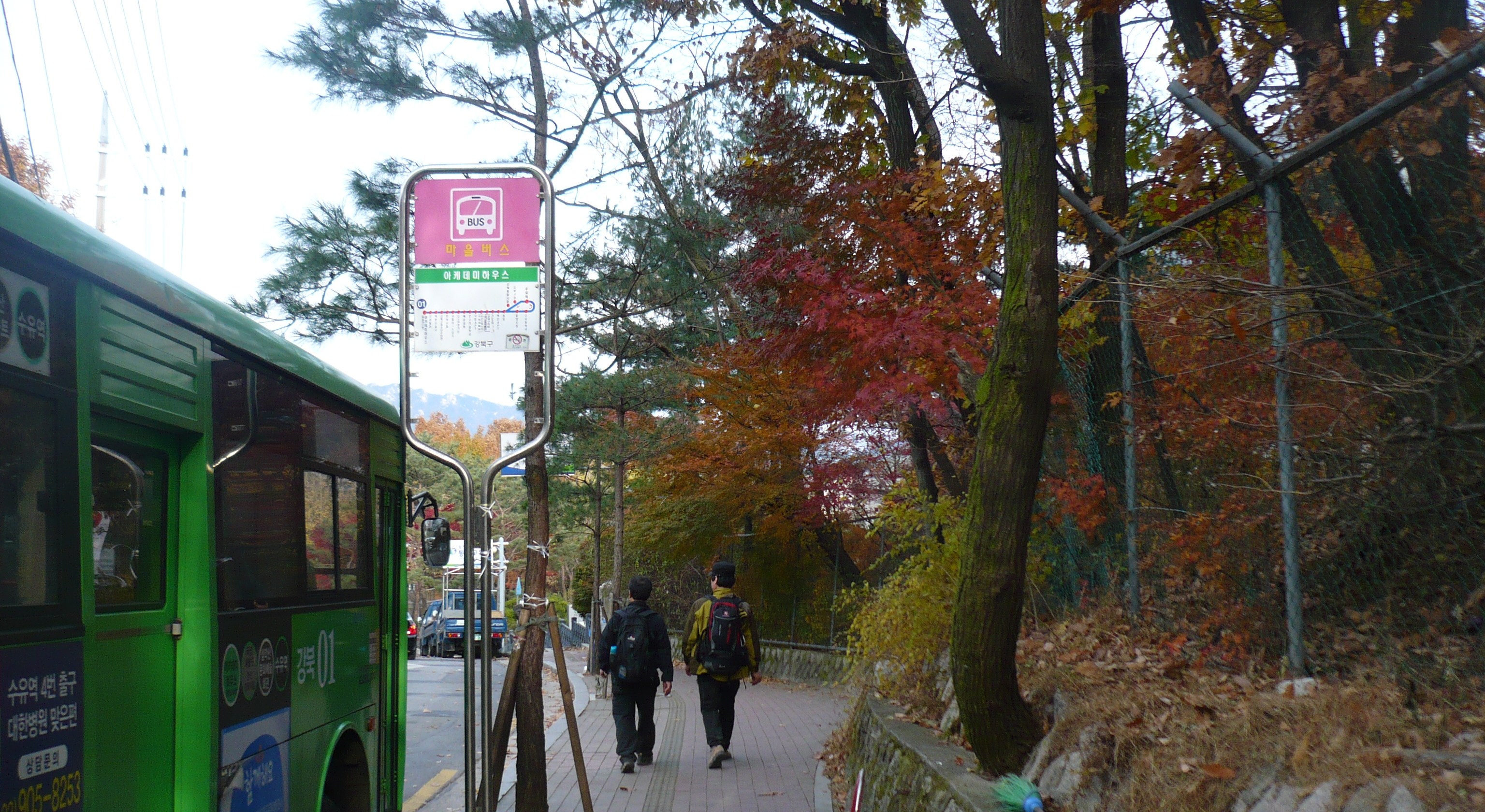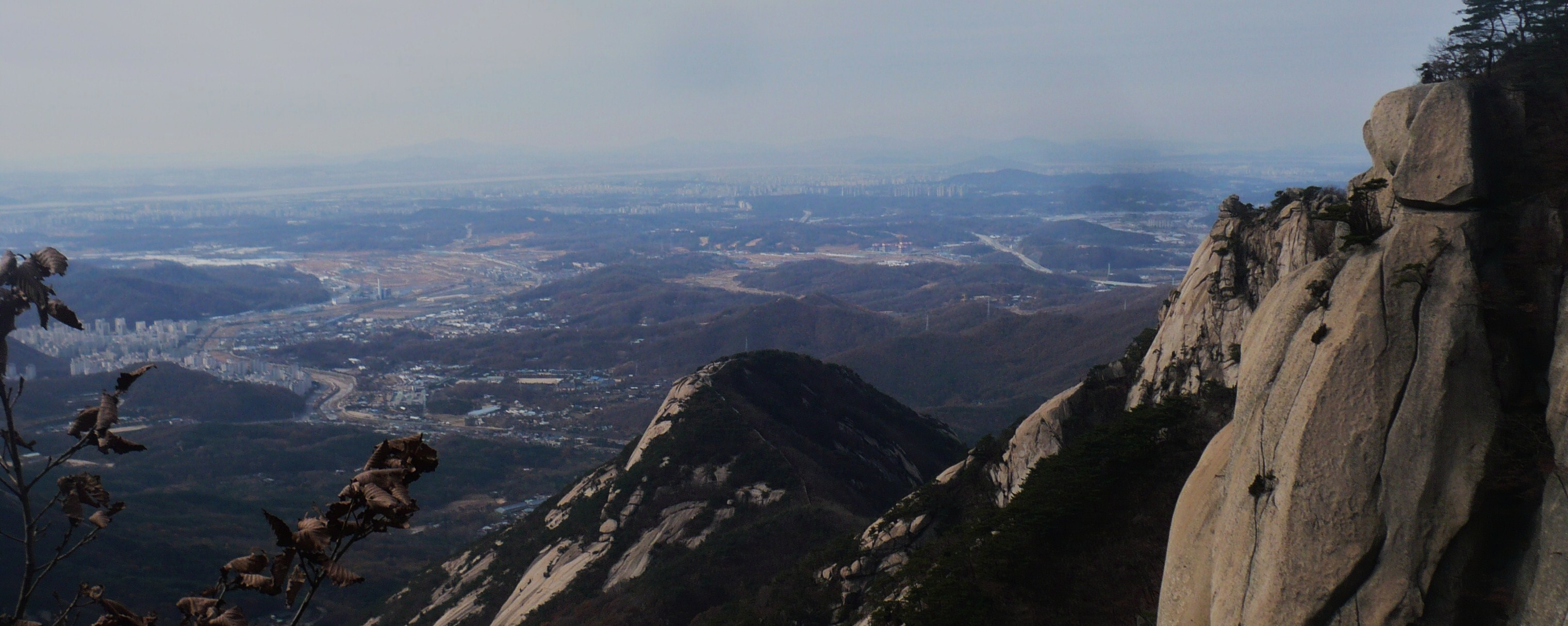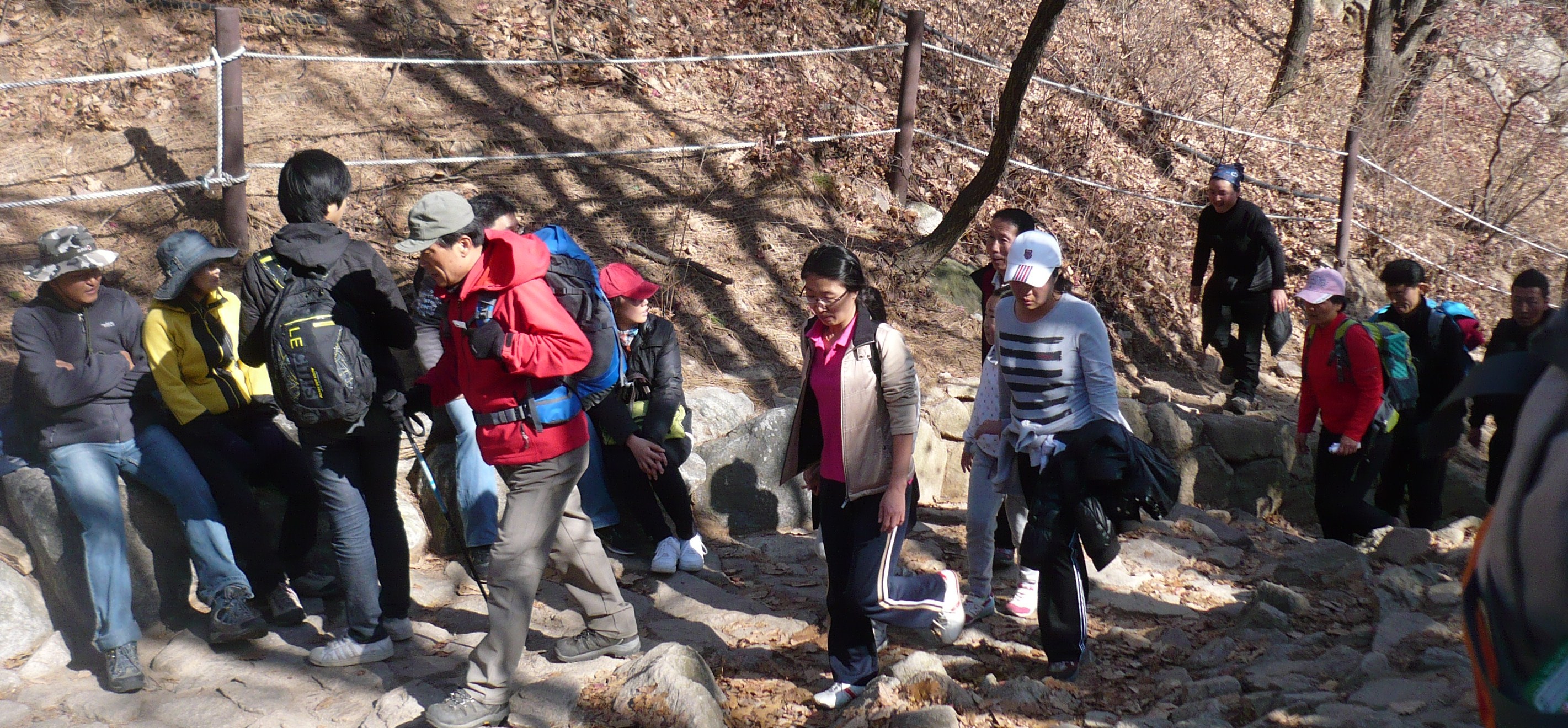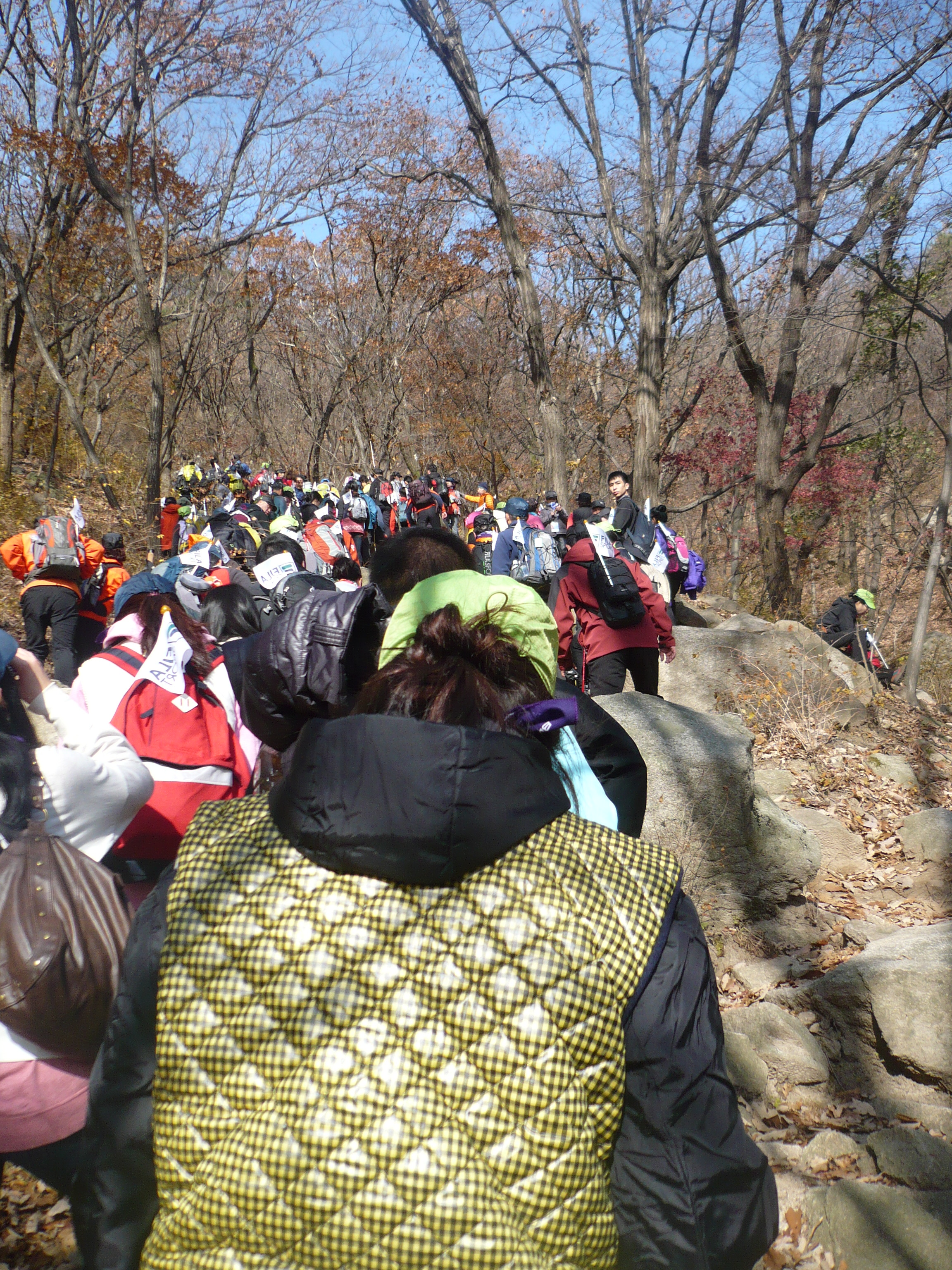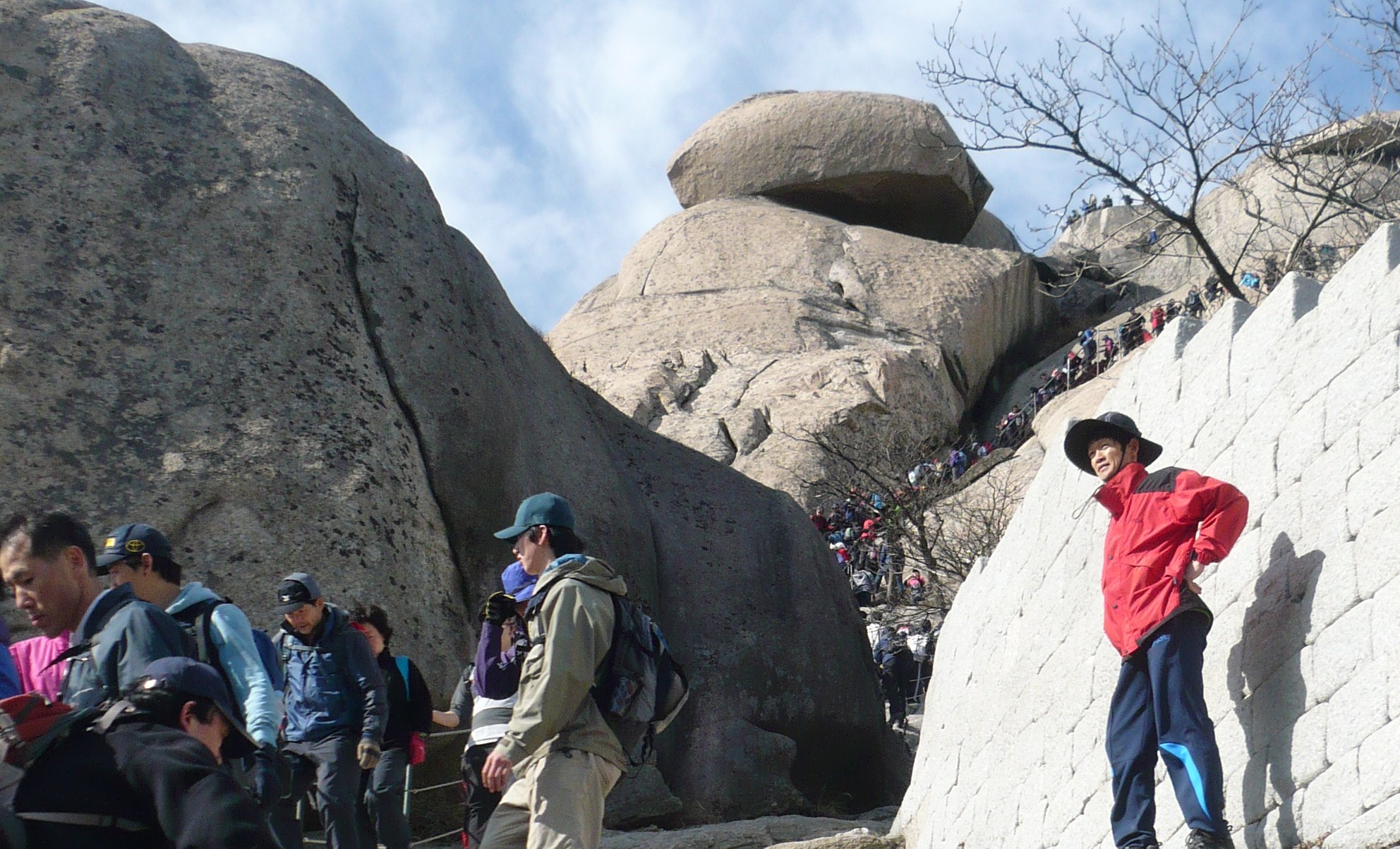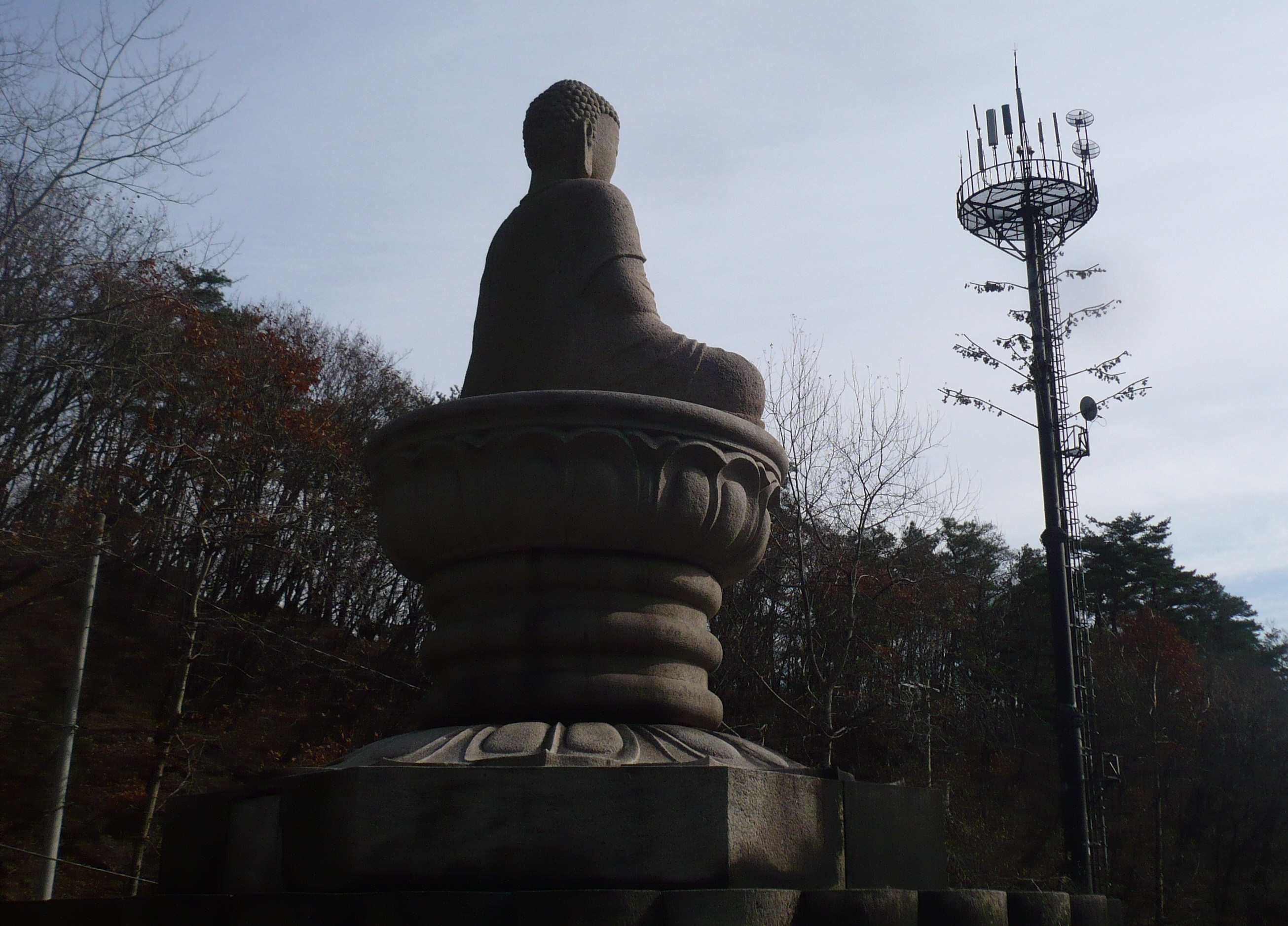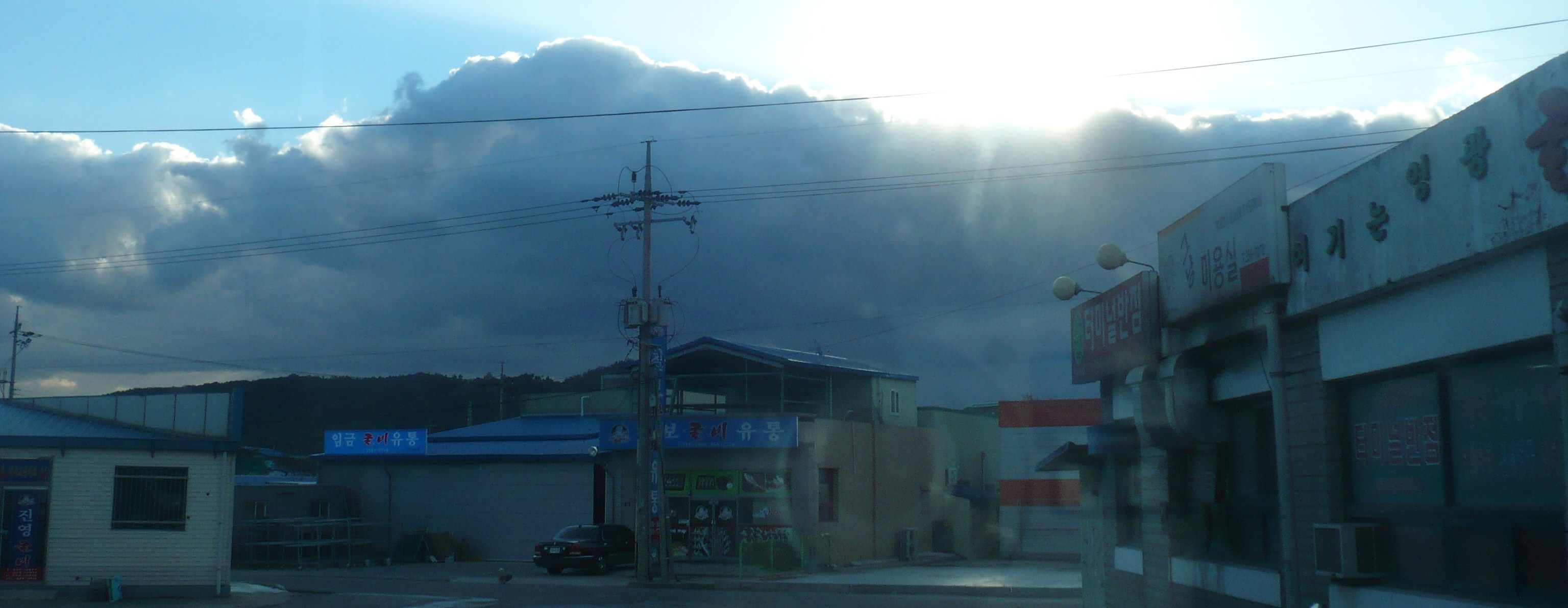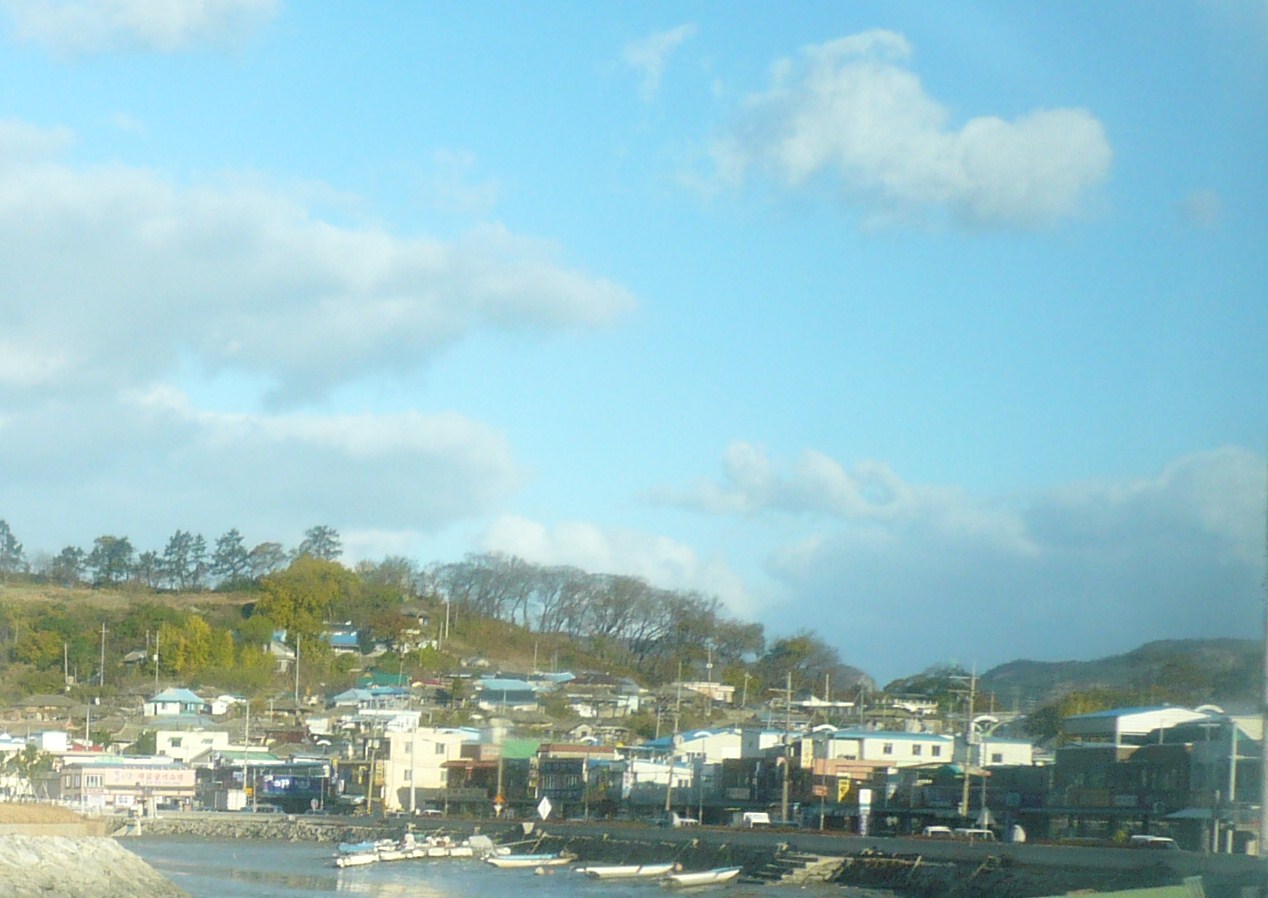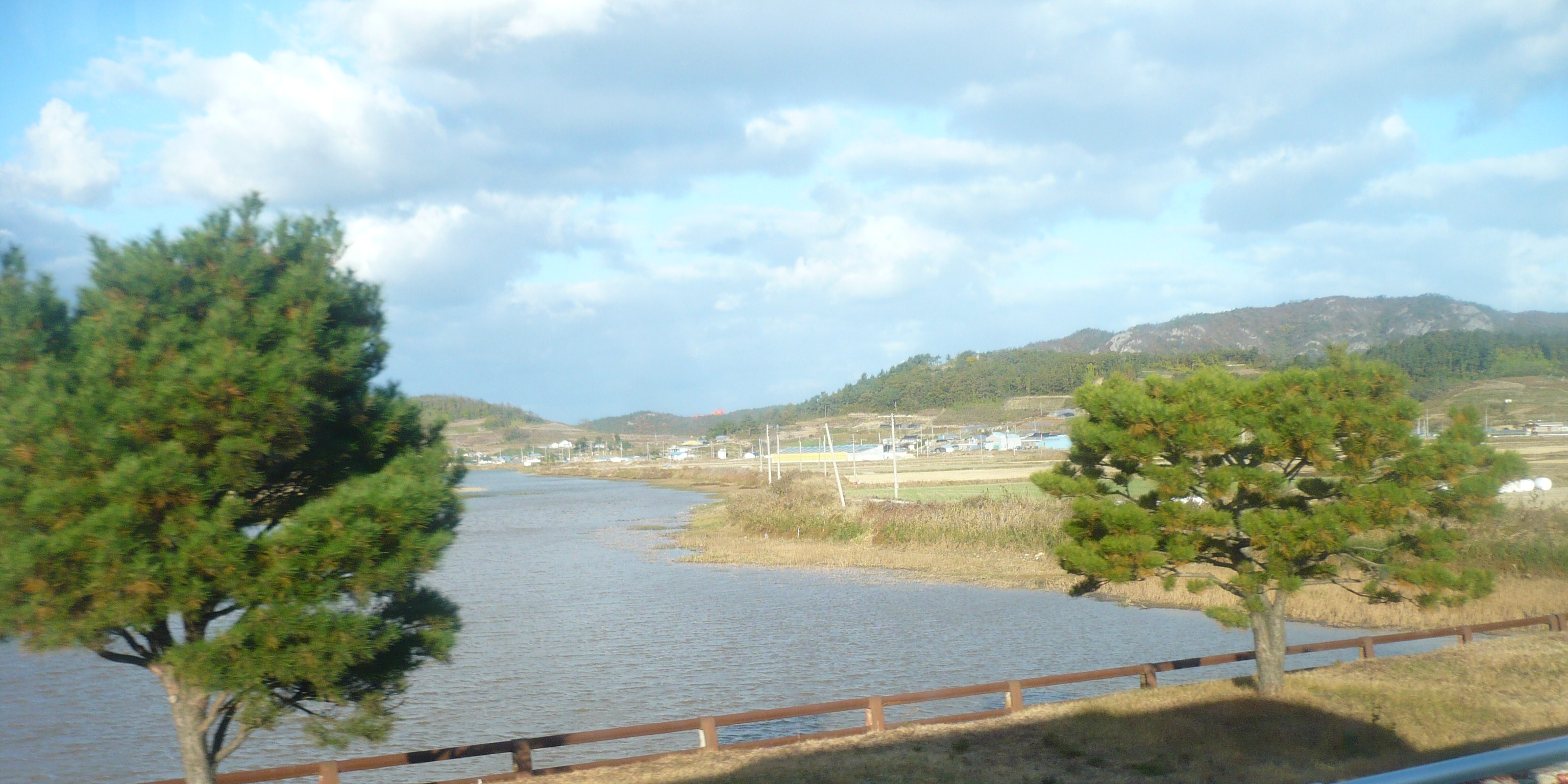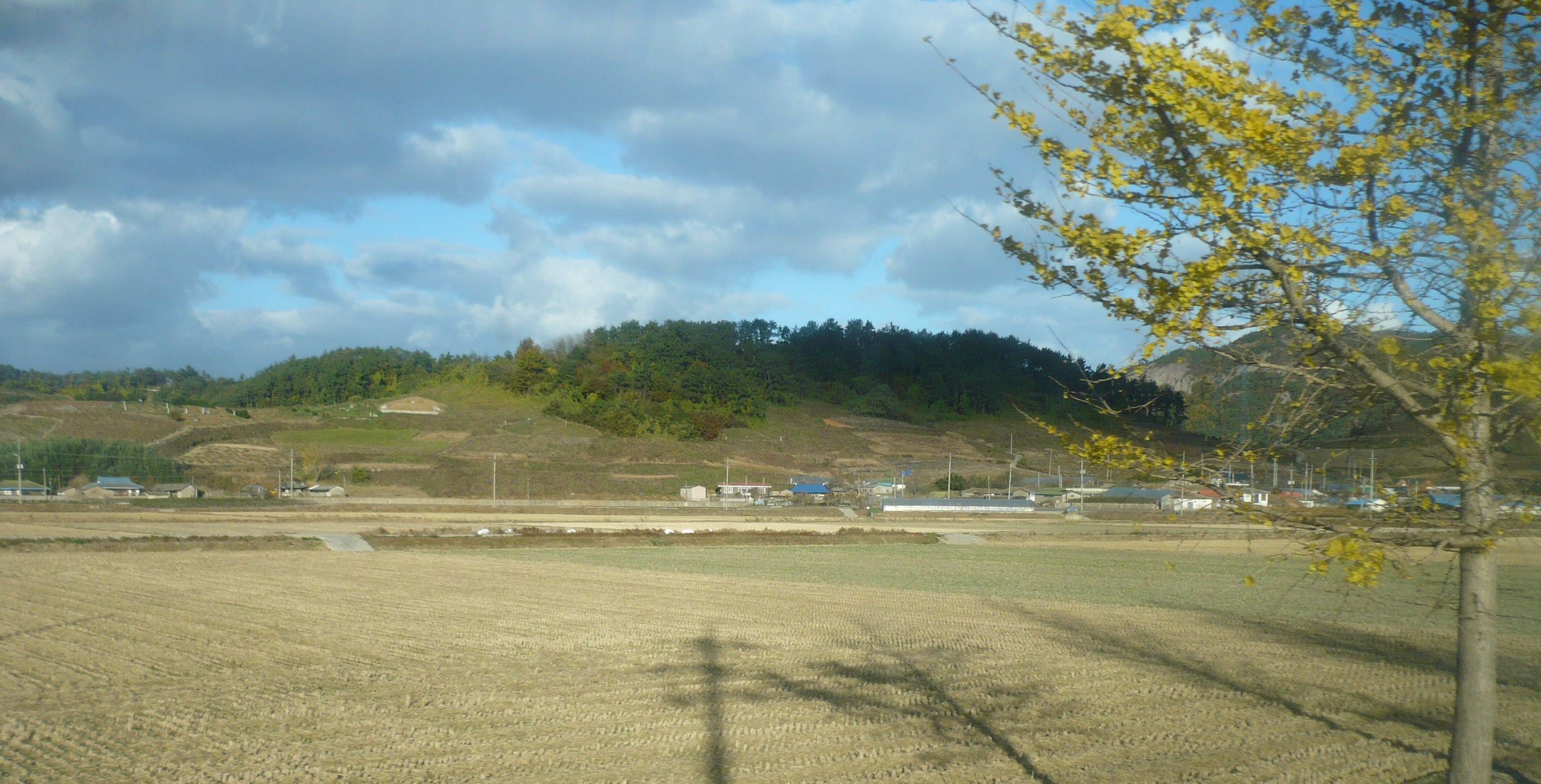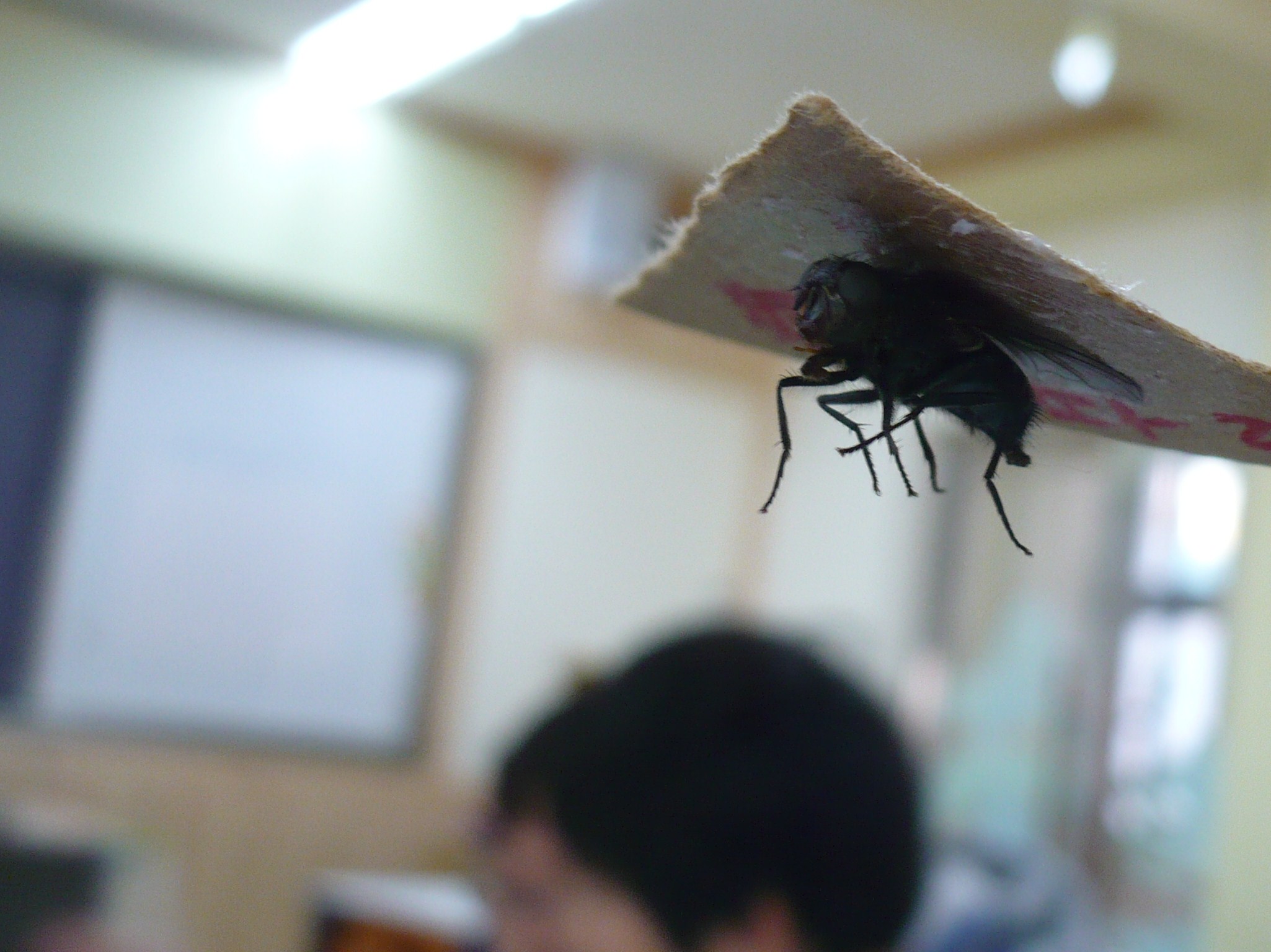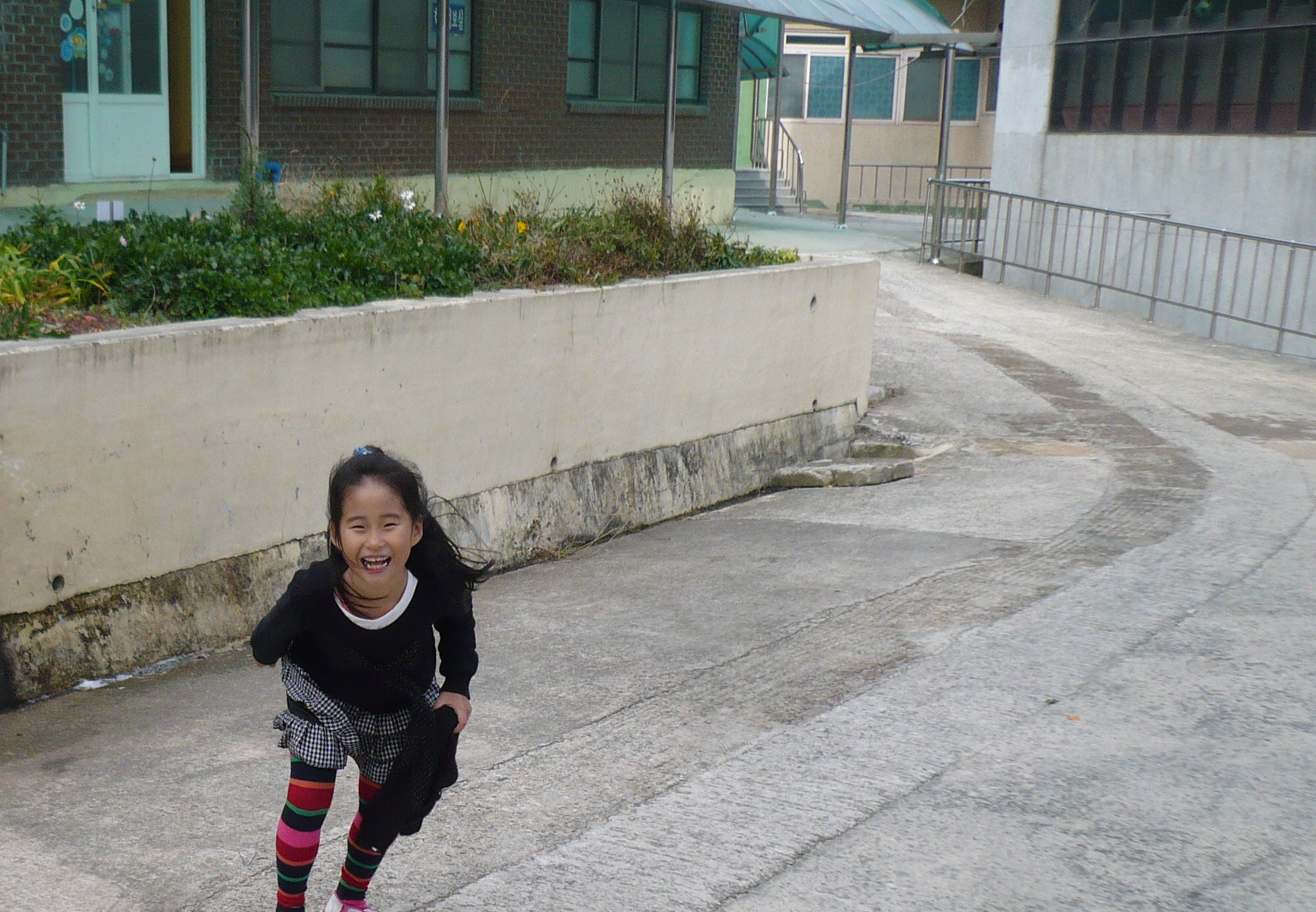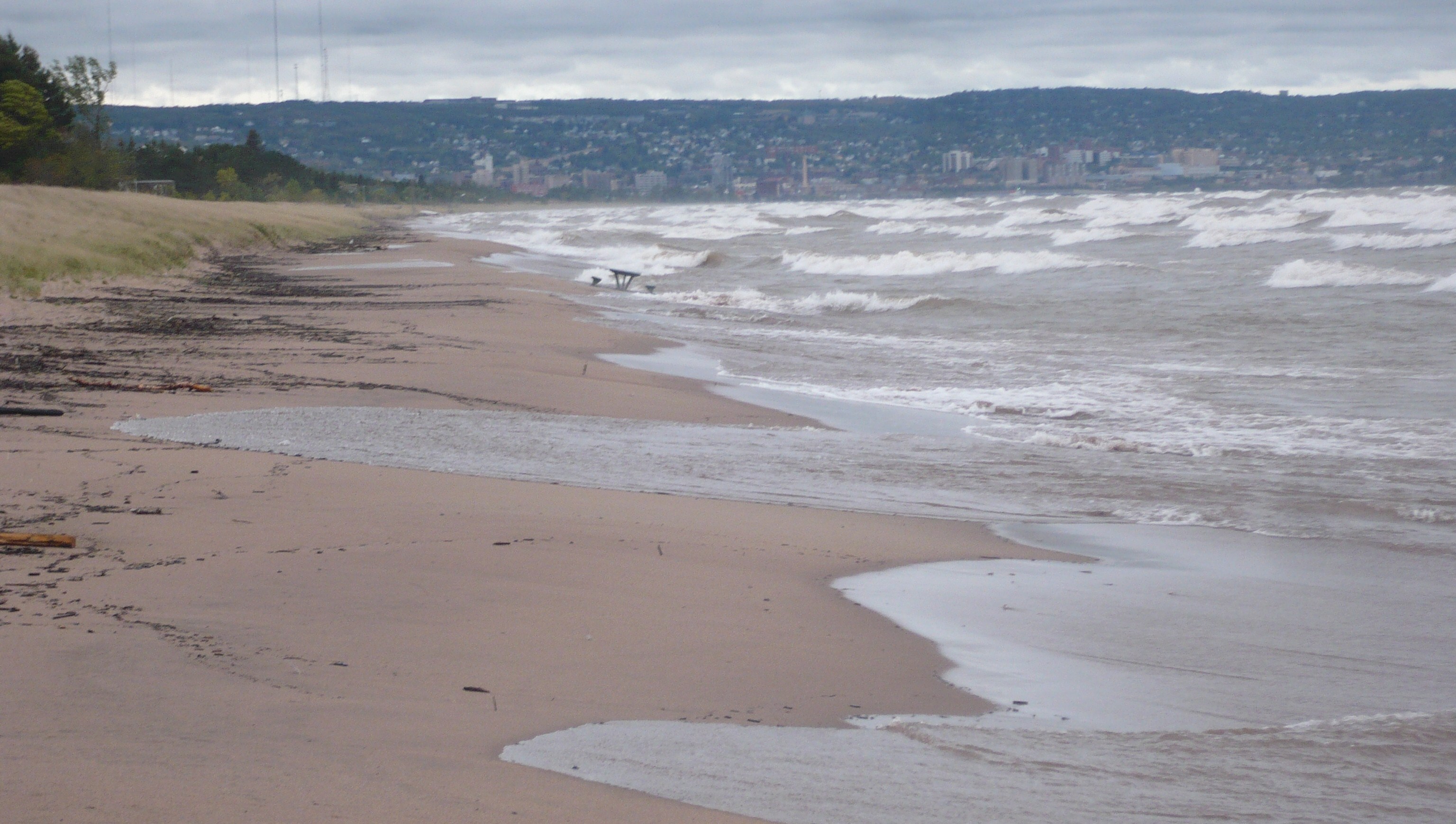When I emerged from my apartment yesterday morning, the sky was heavy and dark with clouds, what is described as black, but in reality they seemed a grayish-bronze color, but fractally textured, with highlights of silver and pink, and even flashes of blue and gold. The clouds seemed to possess infinite mass. It was the sort of sky that in Minnesota or Kansas seems to promise tornado warning sirens and airborne mobile homes. But Korea doesn't seem to get many tornadoes. Looking at the sky was like looking at a passage from the Book of Revelation, and, with the war hovering off the northern horizon in the back of my brain, I found myself imagining I could smell a hint of gunpowder in the air.
Caveat: “미국 추석”
Caveat: 13) 입을 수있게 해 준 모든 인연 공덕을 잊고 살아 온 죄를 참회하며 절합니다
“I bow in repentance of any misdeeds lived, forgetting the public virtues of – and my ties to – all those things that I am able to wear.”
This is #13 out of a series of 108 daily Buddhist affirmations that I am attempting to translate with my hands tied behind my back (well not really that, but I’m deliberately not seeking out translations on the internet, using only dictionary and grammar).
…
11. 배울 수있게 해 준 세상의 모든 인연들을 잊고 살아 온 죄를 참회하며 절합니다.
“I bow in repentance of any misdeeds lived, forgetting any of all the origins of the world that can be learned.”
12. 먹을 수있게 해 준 모든 인연들을 잊고 살아 온 죄를 참회하며 절합니다.
“I bow in repentance of any misdeeds lived, forgetting my ties to all those things that I am able to eat.”
13. 입을 수있게 해 준 모든 인연 공덕을 잊고 살아 온 죄를 참회하며 절합니다.
I would read this thirteenth affirmation as: “I bow in repentance of any misdeeds lived, forgetting the public virtues of – and my ties to – all those things that I am able to wear.”
Humility. Humility.
[UPDATE: So it occurs to me, on rereading this much later, that I have misunderstood this aphorism – this one, and all those that have the same structure “…misdeeds lived, forgetting…”. The “forgetting my X” is in fact an example of the “misdeeds lived” – which is to say, you’re repenting for failing to experience the feeling in question.]
Caveat: Closet Koreanophile
I think one reason I don't always enjoy hanging out with "fellow foreigners," in my current life, is because of the unshakable feeling that I'm "in the closet." In the closet about what? In the closet about really liking Korea. Most of the time, in my experience, groups of foreigners hanging out in Korea devolve into complainfests, during which nothing more is uttered than unending condemnations of some abstract Korean "way of doing things" and gross negative cultural stereotyping.
For me, it's all-too-easy to fall in with this style of talking and thinking, too. Of course there are things that are frustrating or annoying about my life here. But my perspective is that American ways of doing things, or Mexican ways of doing things (to name the two cultures which are most familiar to me, outside of the Korean one), are just as annoying or frustrating, and in some instances more so, in their own divergent ways.
My problem is that as a sort of social chameleon, I just go along with it. All the complaining is compelling. But then I regret having done so later. Negativity is kind of like alcoholism or something – you know it's bad, but social pressure drives you to drink, anyway, and then you regret it later.
When I try to buck this complaining-about-Korea trend – when I try to say something that focuses on the positive or points out the shortcomings of other cultures vis-a-vis the standards they're failing to enunciate – I end up feeling like a gay person in crowd of polite homophobes, or an agnostic at a Florida church meeting: there's no open vitriol, but there's a sort of "uh oh, what's wrong with this guy?" with lots shaking of heads and snarky asides, as the other foreigners I'm hanging out with come to the realization they're in the company of a closet Koreanophile.
Hanging out with Koreans has drawbacks too – not least is that I tend to miss the ability to have deep, intellectual converstations, due to the generally lacking language proficiency. But the negativity trap (and I'm openly admitting that I fall far too easily into this trap myself – it's not like I'm trying to blame others for my problem) is a dangerous one, for me. I need to stay out of it.
Caveat: up to page 9 – empirical syntax?
Twice before, I’ve referenced my efforts to read a recently-acquired book entitled Understanding Minimalism (Hornstein, et al.). In my last entry about it, I’d made it up to page 5, and I was making some initial complaints.
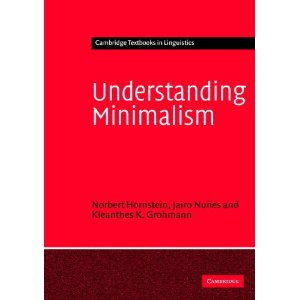 Now I’ve progressed to page 9, and I’m regaining some positivity about why it is I decided to try to undertake reading this book. I have long felt that the “traditional” Chomskyan approach to syntax theory is epistemologically naive. It relies far too much on a sort of ideologically blinkered introspection with respect to the “syntactic evidence,” and thus disregards the real linguistic production that’s out there in the “real world” – with all its strange, un-sentence-like constructions, incompletions, ellipses, mispronunciations (or typos, in text-based communication), etc., ad nauseum.
Now I’ve progressed to page 9, and I’m regaining some positivity about why it is I decided to try to undertake reading this book. I have long felt that the “traditional” Chomskyan approach to syntax theory is epistemologically naive. It relies far too much on a sort of ideologically blinkered introspection with respect to the “syntactic evidence,” and thus disregards the real linguistic production that’s out there in the “real world” – with all its strange, un-sentence-like constructions, incompletions, ellipses, mispronunciations (or typos, in text-based communication), etc., ad nauseum.
All these things are fully understandable, and “typical,” unsophisticated native-speakers rarely are able to enunciate, much less elucidate, judgments of “grammaticality” such as abound in most linguists’ efforts at syntactic theory (as I discover, almost daily, when trying to get Koreans to help me understand their language, in my own efforts to acquire it).
So this “minimalist project” is appealing to me because it promises a return to empiricism. Here is a quote from page 9, spanning the end of one paragraph and the beginning of another, that expresses something I’ve wished I could do myself, before (if I was actually a linguist and not just a dilettante):
…one minimalist project would be to show that all levels other than LF [Logical Form = representation of meaning in the brain] and PF [Phonological/Phonetic Form = actual spoken language passing through the air] can be dispensed with, without empirical prejudice. More concretely, in the context of a GB [Government and Binding]-style theory, for example, this would amount to showing that D-Structure (DS) and S-Structure (SS) [DS and SS are components of “traditional” Chomskyan syntax, e.g. Government and Binding and antecedent theories] are in principle eliminable without any empirical loss.
I remain suspicious about what level of empiricism will be achieved – there still is a reliance on “introspective judgments of grammaticality” which I always have disliked. And worse, there is the mere fact of labeling the “internal representation” end of any linguistic faculty as a “Logical Form.” The problem with this conception is that it flies in the face of most of what we understand from neurology or empirical psychology: human brains don’t do much logic, on the inside. “Logic” such as is used in LF engines in syntactic theory is artificial, external, mathematicized, philosophical. It’s precious Montague semantics and beloved lambda calculus. Such things may have some “real” correlates in neuronal/synaptic architecture, but I don’t think we’re going to make much progress with the “brain as logic engine” model – if we were going to make such progress, we’d also be making progress with artificial intelligence (which is simply the inversion: “logic engine as brain”) – which we’re most definitely not.
I would prefer a more neutral conception of the “internal representation,” that doesn’t betray such preconceptions – as the term “Logical Form” does – about how it might actually work. Semantics strikes me as by far the shakiest of the foundations of contemporary linguistic theory – we really don’t seem to know a lot about how semantics work.
What is meaning? In passing, I will return to pointing at Taylor’s important work, Linguistic Categorization – which addresses the important intersection between semantics and what one might call meta-syntax – what do we really know (as unreflective speakers, not as epistemologically well-grounded linguists) about the grammaticality of what we are saying?
Caveat: The War Goes On
The Korean War entered a new, slightly more volatile phase earlier today. Yes, the Korean War never ended. Did you know that?
It was only ever a cease-fire. So… to those who are worried about me: I'm fine. Life in this prosperous and amazingly peaceful nation-at-war goes on as normal. It happens like this, sometimes. It's just the way things go. ^_^
Caveat: Why I’m Not Vegan
I should be vegan. But I'm not vegan.
At core, I am entirely sympathetic with both the ethical and health-based arguments in favor of a vegan diet.
RE Ethics:
I'm not even thinking in terms of the animal-cruelty / infliction-of-suffering issues. Those are concerning, but for me, they don't really offer a compelling case in and of themselves, because I suspect that, in the broader scheme of things, suffering on the part of individuals is inevitable – it's a part of existence. Do animals raised for food suffer more than animals in the wild? Yes, certainly, many times – especially in factory farming that is so common nowadays. But animals suffer more in nature, too, sometimes. If we pursue this ethic to it's logical end point, we end up banning carnivorism from nature, and throwing tigers or eagles in prison. Silly.
No, for me, the ethical argument is about sustainability, carbon-footprint, environmental impact. I'm one of those who believes the eliminating meat from the human diet would probably have more impact on global CO2 emissions than eliminating the automobile. Seriously – this is very likely true. If we want to have an environmentally sustainable future, we must, as a species, move toward a sustainable diet, and such a diet really can't include meat for 6~7 billion plus humans.
RE Health:
When I was losing my 60+ pounds (25 kilos) in 2006~2007, I did so, mostly, while consuming a vegan diet. I felt healthier, and it was much easier to keep within the calorie rules I'd set for myself. But several things favored that approach, at that time, including leading an almost entirely solitary lifestyle (not going out with friends, not having an out-of-home job e.g. I was working from home, etc) and living across the street from a very well-stocked and progressive grocery store (the Lunds in Minnapolis's Uptown).
The fact is, however, when it comes to actually practicing veganism, there are two contravening factors: my laziness and my character.
RE Laziness:
I am stunningly lazy. And being vegan in Korea (where everything you eat, when eating out, in infused with animal product; and where meat-eating is fetishized to an even greater degree than in the US – really!). Also, my laziness affects my ability to resist cravings and habit, too. I have a craving for, and a habit for, things like dairy products, especially. I just simply like them, and not eating them is hard. Kind of like jogging every day is hard. And so, because of my laziness, I don't do it. I buy cheese, and eat it. I keep butter, because I like it. I have tuna, because it's easier than making sure I've complemented my grains and legumes properly in every meal so as to get the right dosage of protein. Laziness.
RE Character:
I am socially a chameleon. I'm timid, in a way. I don't like to "make waves" when socializing with people, and socializing with people is often done over food. I prefer seek out moderation, and seek out the path of least resistance in social situations. And especially in Korea, declaring one can't eat or drink anything (anything!) leads to a lot of difficult excuses, white lies and justifications, for Koreans take near-personal offense if one doesn't eat or drink something on offer. Some in younger generations or who have lived abroad will keep their mouths shut about this, but the offense and confusion, even in those cases, is still there. Trust me.
It's very difficult for Koreans to understand NOT eating something. Perhaps it's the fact that only 2 generations ago, starvation was common, even in South Korea. Starving people rarely make judgments about the suitability of different types of food. And I feel uncomfortable coming across like I'm judging other people, which any declaration of dietary rule-following tends to come across as – it's not my place. Character.
So I'm an opportunitarian. I never buy meat for at home, because I don't actually like meat, so not eating meat is easy for me. But I am unable to kick the dairy-products habit, and I keep eggs and fish, sometimes, too. And when I'm out, I'll eat whatever is given to me: strange Korean things… raw flesh of animals and sea monsters, blood sausages, barely dead creatures, etc. I'm just trying to be polite. It creates a lot of goodwill in my hosts. That goodwill is important.
Caveat: 12) 먹을 수있게 해 준 모든 인연들을 잊고 살아 온 죄를 참회하며 절합니다
“I bow in repentance of any misdeeds lived, forgetting my ties to all those things that I am able to eat.”
This is #12 out of a series of 108 daily Buddhist affirmations that I am attempting to translate with my hands tied behind my back (well not really that, but I’m deliberately not seeking out translations on the internet, using only dictionary and grammar).
…
10. 일가 친척들의 공덕을 잊고 살아 온 죄를 참회하며 절합니다.
“I bow in repentance of any misdeeds lived, forgetting any of the pious acts of my kin.”
11. 배울 수있게 해 준 세상의 모든 인연들을 잊고 살아 온 죄를 참회하며 절합니다.
“I bow in repentance of any misdeeds lived, forgetting any of all the origins of the world that can be learned.”
12. 먹을 수있게 해 준 모든 인연들을 잊고 살아 온 죄를 참회하며 절합니다.
I would read this twelfth affirmation as: “I bow in repentance of any misdeeds lived, forgetting my ties to all those things that I am able to eat.”
This is not a call to fast, nor a commitment to disregard starvation. It’s a call to renounce one’s ties to food – not to renounce food. It’s a hard distinction. Perhaps easier to understand at a philosphical level than at a pragmatic one. Since my personal interest in Buddhism lies more at the pragmatics than in any type of abstraction, this is an important puzzle to solve.
[UPDATE: So it occurs to me, on rereading this much later, that I have misunderstood this aphorism – this one, and all those that have the same structure “…misdeeds lived, forgetting…”. The “forgetting my X” is in fact an example of the “misdeeds lived” – which is to say, you’re repenting for failing to experience the feeling in question.]
Caveat: Zombie Legopalypse
Caveat: Fever
Sick and tired of being sick and tired.
You know… not necessarily anyone's interest, to hear the utter banality of how I feel. But, so… just a general update of where I'm at. Ever since the food poisoning, I haven't felt healthy, and this weekend it's transformed into a full-blown, very unpleasant but highly conventional flu. At least it's not food poisoning, right?
I've done a lot of reading, anyway.
Caveat: this kind of devaluation
"You don't get prosperity through this kind of devaluation" – some talking head (not sure who) overheard on NPR, commenting on the Fed's recent further loosening of money supply, vis-a-vis the perpetually undervalued RMB (Chinese Yuan), etc., etc.
Well… from where I sit, I beg to differ. South Korea has successfully ridden an undervalued currency right through this recent "Great Recession" as if there were only a minor blip on the economic radar. More broadly, over the longer term, South Korea has leveraged an undervalued currency (among other macroeconomic wizardry) into a seat on the G20. As long as people want to buy your stuff (and people want to buy South Korean stuff, from cell phones to cars to cargo ships to nuclear power plants to engineering services for building the world's tallest buildings), you can keep selling.
And so… the US not only should be content to let Bernanke manipulate the dollar lower… I would argue that it really has no choice, in the current global economic context. And it won't necessarily be a bad thing – for the US. It will alleviate federal debt, it will help close the trade deficit.
The bad part will be that it will antagonize countries like South Korea or China that have relied, for so long, on an over-valued US dollar. Could the US (re-)achieve prosperity through "this kind of devaluation"? It depends a great deal on how intelligently (or unintelligently) other countries react. The Chinese and South Korean economies have other strengths that could see them through the inevitable crisis a dollar devaluation could provoke – not least their infrastructure spending and booming domestic consumer markets – but things could still get ugly.
I'm curious how this will play out. Check back at this blog, in 20 years – I'll provide an update.
Somewhat relatedly, from Derek Decloet at the Globe and Mail:
[1] WE, THE LEADERS OF THE G20, are united in our conviction that by working together we can secure a more prosperous future for the citizens of all countries.
[2] However, empty platitudes aside, if presented with an opportunity to make the citizens of our own country more prosperous at the expense of someone else’s country, 20 out of 20 of us will take it, most of the time.
Caveat: 두려움과 배움은 함께 춤출 수 없다
Fear and learning cannot dance together.
Today at work, I got a ride home with my coworker Mr Lee. He’s like the vice-vice principal. I think he’s a nice guy, and I can tell he’s really smart, but I mostly appreciate him to the extent he runs interference with the nefarious vice principal. He has a difficult job.
I used to interact more with him, when I was carpooling with Mr Choi last spring. But Mr Choi transferred to another school, and Mr Lee was too recalcitrant, for whatever reason, to offer carpooling – mostly, I suspect, because he has very little English, and feels badly about that.
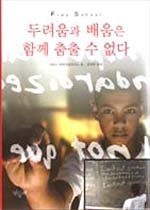 Anyway, I sat in the back seat of his Kia (there was another teacher in the passenger seat, the new social studies teacher who replaced Mr Choi, whose name I haven’t figured out). And there, on the seat, was a book. Being the typical curious person that I am, I began deciphering the title, and with the social studies teacher’s help. And I discovered it was something I’d heard of: the Albany Free School (q.v. at wikipedia). The English title of Mercogliano’s book is Making It Up As We Go Along, but the Korean title is 두려움과 배움은 함께 춤출 수 없다 [fear and learning cannot dance together], which, frankly, I like a lot better (Korean edition cover at left). It’s interesting to me, sometimes, to realize there are a lot of “new ideas” circulating in education circles, in Korea – even in a backwater like Yeonggwang County, where the evidence of progressive pedagogy on the ground is almost zero. Given my own background in “alternative education” (both my grandparents’ “Pacific Ackworth” experiment (1940’s-60’s), and my own time at Arcata’s “Centering School” and my teaching at “Moorestown Friends” in 97~98… all these things have exposed me to a lot of alternative pedagogical thought and left me convinced that convention, in education, is way overrated.
Anyway, I sat in the back seat of his Kia (there was another teacher in the passenger seat, the new social studies teacher who replaced Mr Choi, whose name I haven’t figured out). And there, on the seat, was a book. Being the typical curious person that I am, I began deciphering the title, and with the social studies teacher’s help. And I discovered it was something I’d heard of: the Albany Free School (q.v. at wikipedia). The English title of Mercogliano’s book is Making It Up As We Go Along, but the Korean title is 두려움과 배움은 함께 춤출 수 없다 [fear and learning cannot dance together], which, frankly, I like a lot better (Korean edition cover at left). It’s interesting to me, sometimes, to realize there are a lot of “new ideas” circulating in education circles, in Korea – even in a backwater like Yeonggwang County, where the evidence of progressive pedagogy on the ground is almost zero. Given my own background in “alternative education” (both my grandparents’ “Pacific Ackworth” experiment (1940’s-60’s), and my own time at Arcata’s “Centering School” and my teaching at “Moorestown Friends” in 97~98… all these things have exposed me to a lot of alternative pedagogical thought and left me convinced that convention, in education, is way overrated.
And there, on the back seat of a vice-vice principal’s car in Yeonggwang County, Korea, there was another little piece.
[this is a back-post, added 2010-11-20]
Caveat: “I love me”
Who said “I love me”?
I had my last “genius class” of the term, this evening. “Genius class” is a Konglishism for something that would be described in the US as a gifted program, maybe. The classes aren’t held at my school, Hongnong, but rather at the county office of education in scenic and happenin’ downtown Yeonggwang. Working for this office is the closest I have ever come, in my life, to existing inside a Kafka novel. It’s almost pure non-communication.
For example, I found out that I had to give a final test, tonight, because someone at the office sent a text message last week – not to me, but to someone who used to work at that office but that happened work at Hongnong Elementary. That’s the only communication ever received by me about the fact that I had to give a final exam. That’s just one example.
Anyway, I made a final exam, and gave it this evening. Despite the unadulterated bureaucratic horrors of working for the office, and the fact that the kids don’t really seem all that gifted to me, I found myself thinking that I’ll miss the kids. I always end up getting nostalgic, for the kids.
One of the kids is a girl named Ye-jin. She wrote a really terrible test. Her English seems almost non-existent. But she drew a picture on the back. Here it is.
The picture made a big impression on me. The thing that was striking to me about it was that it portrays me as seeming so overconfident, almost arrogant. I know I come off that way, to others. It conceals deep insecurities, of course. My student attributed to me thoughts such as “I love me!” (twice) and “Peoples are love me!”
Actually, I think it’s not just OK, but probably important to convey a very strong sense of self confidence when teaching kids – and as this picture reveals, apparently, I do exactly that. But it’s all a front, of course. I’m a deeply insecure person.
Nevertheless: “I like monkey.”
Caveat: SurveyMonkey
I've been playing around with a tool called SurveyMonkey. I want to make a survey that English teachers working in Korea can take, as a sort of way to rate and collect data about how English teachers feel about the schools they're working in. I'm just playing around with it, at this point. Partly, my interest in this is lies in the fact that I fully intend to renew somewhere in Korea, but can't decide where – I just know that, as things stand currently, I'm not likely to want to renew at Hongnong, specifically.
But I've actually been thinking about this for a long time. There is such a dearth of good, structured information about how English teachers feel about their teaching / working environments. I hate websites like DavesESL, because the tone there tends to be profoundly unprofessional, and frankly, I don't trust the things people write about schools or hagwon on sites like that, because of that.
So I've created a "first draft" of a survey that asks questions about teaching / working experience. It's not meant to be exhaustive – it's just focused on my specific areas of interest, and my specific anxieties, at the moment. Maybe over time, I'll expand it into something "real." We'll see. Here's the survey: https://www.surveymonkey.com/s/SWB7NWW
Caveat: Chomsky
I am drawn to Chomsky, intellectually. Yet I find actually attempting to consume his intellectual production, in either linguistics or in ideology (politics), extremely annoying. He's an annoying, self-righteous narcissist. But an undeniable genius.
There's a very interesting interview with him, recently published at Tablet. It focuses on his specifically Jewish identity raised as a "cultural Zionist."
In conclusion, though… he's not a moral relativist: "You can’t get out of your skin. But when we get down to the moral issue, it’s independent of one’s personal background."
Caveat: 11) 배울 수있게 해 준 세상의 모든 인연들을 잊고 살아 온 죄를 참회하며 절합니다
“I bow in repentance of any misdeeds lived, forgetting any of all the origins of the world that can be learned.”
This is #11 out of a series of 108 daily Buddhist affirmations that I am attempting to translate with my hands tied behind my back (well not really that, but I’m deliberately not seeking out translations on the internet, using only dictionary and grammar).
…
9. 부모님께 감사하는 마음을 잊고 살아 온 죄를 참회하며 절합니다.
“I bow in repentance of any misdeeds lived, forgetting my heart full of thanks to my ancestors.”
10. 일가 친척들의 공덕을 잊고 살아 온 죄를 참회하며 절합니다.
“I bow in repentance of any misdeeds lived, forgetting any of the pious acts of my kin.”
11. 배울 수있게 해 준 세상의 모든 인연들을 잊고 살아 온 죄를 참회하며 절합니다.
I would read this eleventh affirmation as: “I bow in repentance of any misdeeds lived, forgetting any of all the origins of the world that can be learned.”
This seems like one of the aspects of Buddhism that I find least attractive: a sort of epistemic nihilism, an abrogation of curiosity in the nature of reality. “We know the ‘real’ reality, so all this reality we see around us doesn’t really interest us.” Then again, that seems to be a feature of any kind of religious certainty, perhaps. Including faith-based atheism?
I’ve been thinking a lot about the “purity narratives” (which all of these affirmations reference, via the concept of repentance), too. They bother me. I’m not interested in purity, and I don’t view defilement (i.e. lack of purity) as a valid concept in a philosophically materialist (anti-transcendent) worldview. But even such as statement as “not a valid concept” is actually a sort of purity narrative, isn’t it? “Material reality is being polluted by concepts of purity! Oh no!” … stuck in a paradox of dialectical thought…
[UPDATE: So it occurs to me, on rereading this much later, that I have misunderstood this aphorism – this one, and all those that have the same structure “…misdeeds lived, forgetting…”. The “forgetting my X” is in fact an example of the “misdeeds lived” – which is to say, you’re repenting for failing to experience the feeling in question. This is especially relevant in the context of this one, since my misunderstanding sent me off on a bit of an ideological tangent about epistemology and “purity narratives”, that turns out to have been unjustified by the original text. The tangent stands, but the cause has disappeared. A koan?]
Caveat: Really, It Was the Crowds
Any Westerner who has spent time in Korea knows about the “subway ajumma” – the experience of being shoved or trampled by what one would initially expect to be benign tribes of elderly women. In general terms, Koreans have very few of the qualms or social constraints on pushing, shoving, cutting in line, etc., that are so important in typical Western culture. For the most part, in the subway, I’ve gotten used to this and it doesn’t bother me in the least.
Yesterday, however, I had decided to go up to Seoul and go hiking with my friend Mr Kim at Bukhansan National Park. There was something a little bit crazy in driving up to Seoul on Saturday night for what seemed the sole purpose of hiking and Sunday, and then heading back south again Sunday night. That appealed to me. Really, I think Mr Kim had some kind of important errand to run, and he decided this would give an excuse for the trip.
He has a small apartment in an excellent location in Seoul. I think it’s a sort of “investment apartment” – he uses is a few days every other month, or so, as a kind of dedicated hotel room up in the capital. I understand the investment angle – I’m sure, based on its location, that it’s worth a mint. It’s a few blocks from city hall, within the boundary of the now non-existent ancient city walls, near the “media district” (where the newspaper headquarters buildings are strung out between city hall and Seoul Station) and several universities that climb the hills west of downtown toward Dong-nim-mun.
We got there sometime after midnight, Saturday night. We woke up pretty early, but he went to run his errand (to the building manager’s office, he said), and we ate ramen for breakfast. We started hiking from the east side of the Bukhansan (in northeast Seoul) at around 9:30.
The crowds were stunning. It was like hiking in the midst of a migration of goats. I really wasn’t feeling that healthy, it turned out, either. Cold-like symptoms, and still not as energetic as I was feeling before my food poisoning, two weeks ago. After several hours, we ended up skipping the peak. Mr Kim was gamely pushing and shoving his way toward the top, but one elbow too many on a precarious-seeming ledge caused me to finally put my foot down and say, simply, “I can’t do this.” I think he understood why I was unhappy. We got away from the worst of the crowds on an alternate path down.
For future reference – be careful when opting to go hiking in a major national park located within walking distance of the Seoul subway system on a stunningly beautiful (if somewhat chilly), sunny November Sunday.
Here are some pictures.
Leaving my apartment, around sunset on Saturday night. The view southwest from in front of my gas station (which is in front of my building).
Several views from the top of the building where Mr Kim’s apartment is.
Some things that I saw on the mountain, despite the crowds.
Looking toward my old home, Ilsan.
The crowds. Let’s all go climb a mountain! Is this fun?
An iconic image that I think well captures contemporary Korea’s spot between past and future.
Caveat: 재미없는 등산한데 아주 피곤해졌어요
I’ve had better hiking trips. Definitely: a) I wasn’t as healthy as I was hoping – still a bit run over by the food virus thing I had; b) Bukhansan was very very very very very crowded – it was like hiking among rocks and sheer cliffs, but in the Seoul Subway during rush hour.
There were some positive aspects. I still get along with Mr Kim – he tolerated me when I lost my cool over the crowds in the park. I think his English is improving. Do I get to take some credit for that?
I’ll give more detailed review and pictures later. I’m too tired now.
Caveat: Seoul? OK.
I'm sitting, reading, and listening to Genki Sudo.
My friend Mr Kim called me. He said, "I'm driving Seoul. You come Yeonggwang Sunday night. I think? We stay my house in Seoul. We hike tomorrow. We meet Gwangju, 7 8 hour. Are you OK?"
He was inviting me. He has a house in Seoul? Interesting. I'm off to catch a bus into Gwangju. Good to be open to spontaneous adventure, at least sometimes. See you later.
[And by the way, I'm not in any way mocking his English – I'm sure my Korean sounds just as terrible. He and I do an amazing job communicating with one another, given how bad our skill is in each other's languages.]
Caveat: Toast
Caveat: I Dreamt I Was a Cow
Really. Not even a real cow. I woke up, this morning, from a dream in which I was pretending to be a cow on stage, in a silly cow costume.
Perhaps this is how my subconscious deals with the anxieties around performance and managing children, in the context of yesterdays huge open-house and bigwig inspection, at work? I'm not averse to being silly – I've donned many a mask or goofy hat or wig during teaching time. But dreaming about it, in an otherwise amorphous setting, is a bit unexpected.
I may meet my friend Mr Kim later today, but at the moment, I'm feeling unmotivated. I will just relax this morning, I guess.
Yesterday went OK. I met one of the important people from the power plant, which provides so much of the supplementary funding that makes this otherwise poor rural school amazingly wealthy. He had bad teeth and bad English. I shook his hand and said "만나서 반갑습니다."
There was a funny moment when I was meeting some of the kids' moms. Ms Ryu introduced several of them to me, as they sat around a table eating green-tea cookies and chatting about who-knows-what. She said, "This is Ha-jin's mom, and this is Gyu-tae's mom."
"Oh, Gyu-tae," I cried out. "Oh, my, god," I added, reflexively – because Gyu-tae is a behaviorial challenge of the first order. The woman seemed to understand that reaction, though, because everyone just started laughing, including Ms Ryu. Gyu-tae is a great kid: smart and big-hearted. But he's never, ever, under any condition… still or focused. When I have him in my afterschool class, I probably say things like, "Gyu-tae, sit down, please," or "규태야, 그렇지 마세요" [Gyu-tae, don't do that] once every several minutes.
Caveat: The Meanwhile Knob
Overheard on NPR, this morning (well, yesterday afternoon, in NPRland): Lynda Barry (cartoonist, author and one-time romantic interest of Matt Groening) is talking about someone else's innovation on the time-machine concept, with the introduction of a "meanwhile knob." Not much detail is provided as to how the "meanwhile knob" works, but I'm deeply intrigued. I've long thought that a good time-machine should include more than just a simple "front-back" control. I've long enjoyed the Heinleinian conception of a multidimensional "alternate-universes" control, where you can go back or forward not just to "your" past or future, but, by missing the correct calibration, end up in infinitely variant alternatives as well.
But the idea of a "meanwhile knob" is even more interesting. I think for Barry, based on the context of her comments, it's intended to capture the fact that "inside time" – how we perceive time and carry it around with us – things are in fact rather non-linear. You can have multiple narratives going: the immediate outside-your-body surroundings, the recent memorable event being reviewed, the historical novel in front of you, the upcoming meeting which you're planning out in your head. So a time machine with a meanwhile knob suddenly becomes as much a device for altering consciousness as one that somehow alters physical reality. Which, of course, given the physics of time travel, may, in fact, be the more plausible way to take on time travel.
Meanwhile, I'm going to get another cup of coffee. I have an intense day coming up, at work. More bigwigs will be visiting our English classroom – there's going to be an "opening ceremony" along with a demonstration class that I and my coteachers will have to do. Someone (read: the nuclear power plant people) has put a huge amount of money into this poorly-designed, high-tech language classroom, and now they want to see how it worked out – it's up to us to make it look good.
Caveat: 10) 일가 친척들의 공덕을 잊고 살아 온 죄를 참회하며 절합니다.
“I bow in repentance of any misdeeds lived, forgetting any of the pious acts of my kin.”
This is #10 out of a series of 108 daily Buddhist affirmations that I am attempting to translate with my hands tied behind my back (well not really that, but I’m deliberately not seeking out translations on the internet, using only dictionary and grammar).
…
8. 조상님의 은혜를 잊고 살아 온 죄를 참회하며 절합니다.
“I bow in repentance of any misdeeds lived, forgetting the favors of our ancestors.”
9. 부모님께 감사하는 마음을 잊고 살아 온 죄를 참회하며 절합니다.
“I bow in repentance of any misdeeds lived, forgetting my heart full of thanks to my ancestors.”
10. 일가 친척들의 공덕을 잊고 살아 온 죄를 참회하며 절합니다.
I would read this tenth affirmation as: “I bow in repentance of any misdeeds lived, forgetting any of the pious acts of my kin.”
Weird, thunderstorm this afternoon. Barely above freezing, howling wind. And thunderstorm.
The students gave me pepero sticks. Today was 1111 = “pepero day.” A sort of crass, Korean, commercial, Valentine’s-type day. But the kids all got crunk on sugar. So it was cute, in a hyperactive way.
I had a third grader say something rather surprising, if not exactly “happy”: I asked him, “How are you?” and he answered, “I’m depressed.” This is not typical Korean third-grader vocabulary, though I know his English is pretty good. So I said, “Why?” and he said, shocking me, “I’m ugly.” I wasn’t sure what to say. Finally, I said, “I don’t really think so.” He’s kind of a dead-pan kid. I couldn’t tell if he was joking or not. I felt kind of sad about it – even if it was just a strange joke.
[UPDATE: So it occurs to me, on rereading this much later, that I have misunderstood this aphorism – this one, and all those that have the same structure “…misdeeds lived, forgetting…”. The “forgetting my X” is in fact an example of the “misdeeds lived” – which is to say, you’re repenting for failing to experience the feeling in question.]
Caveat: Speculative Affirmation
I came across an intriguing challenge: can you summarize your life philosophy in two words? I came up with “speculative affirmation,” which is borrowed from French philosopher Gilles Deleuze’s slightly impenetrable statement: “ethical joy is the correlate of speculative affirmation.” I’ve cited this quote in this here blog three times before. That’s much more than I’ve returned to any other quote, I think. I guess it’s the closest you could get to my favorite quote.
And in other news about gnomic utterances: I’ve made a resolution to post only one-word “statuses” in facebookland. I’m curious about how much I might be able to communicate, posting only one word at a time. Think of it as an effort at lazy, minimalist poetry, or if you prefer, as just a typical manifestation of my obtuse nonsequiturism.
I had a grumpy day at work. I wasn’t coping well with the lack of communication thing, although I should know better than to hope for it. The classes themselves went fine, for the most part, but the in-between times, with my fellow teachers, less so. I kept wanting to say, “why is this happening?” But I knew I’d get nothing logical or meaningful in response. Would it be different if I could be more competent in the language? I suspect not.
Um, so that aforementioned grumpiness doesn’t represent speculative affirmation, does it? It’s not always easy, even if it is an effort to make a life philosophy.
Caveat: Out the window of the bus
I was having some issues with my camera yesterday, so I was messing with it on the bus this morning. I started taking pictures out the window, during the ride to work. The sky was full of clouds, the air was cold. Some of the pictures came out really nicely.
Caveat: Snapshot. Snapshot.
Last week, Won-seok captured a fly, and glued it to a triangular piece of scrap paper. It was still alive. “It’s hang-gliding,” he explained.
Today, it was incredibly cold. I was waiting for my first-grade afterschool class to start, and hanging out with some of them in the area behind the English classroom. The pathway is the one that leads between the gym and the library to the cafeteria. Min-sol was cavorting around in the very, very cold wind and sprinkling of raindrops. There was a rainbow, but my camera failed to capture that. I think it wants to snow.
Caveat: Catalan Nationalist Ska
It reveals the language geek in me, that I think the Catalan language is cool. Just because it is – it’s like Spanish or French (really, a sort of linguistic average between them, in some ways) – but with less of the historic imperial guilt that comes with loving those languages.
 Nevertheless, I’m not sure the world reallly needs more nationalism, regardless of which formerly-oppressed ethnic group it’s elevating. Nationalism can be endearing in a hopeless-case, long-struggle variety, and end up losing a great deal of its charm once instituted as a long-term, triumphalist government (case-in-point: 1920’s Korea contrasted with nowadays, anyone?). Even Catalan nationalism is a bit unusual, though – consider it’s one of those rare nationalist movements that seems to be predominantly on the left, ideologically. Perhaps that’s an inverted legacy of the Falangist Franco dictatorship, which suppressed all things Catalan for so long.
Nevertheless, I’m not sure the world reallly needs more nationalism, regardless of which formerly-oppressed ethnic group it’s elevating. Nationalism can be endearing in a hopeless-case, long-struggle variety, and end up losing a great deal of its charm once instituted as a long-term, triumphalist government (case-in-point: 1920’s Korea contrasted with nowadays, anyone?). Even Catalan nationalism is a bit unusual, though – consider it’s one of those rare nationalist movements that seems to be predominantly on the left, ideologically. Perhaps that’s an inverted legacy of the Falangist Franco dictatorship, which suppressed all things Catalan for so long.
Still, the below is a catchy little song, all things considered. And it’s in Catalan! How cool is that?
Caveat: facebook is going to make me schizophrenic
A rant.
I have a facebook account. Which I use, more and more. Living out there in front of the world, in a glass brain.
And I have several other facebook accounts – set up, somehow, in ways I can't quite recall – linked to other email accounts. Because I have so many email accounts (jaredway@basicallywhateveryoucanthinkof). And facebook doesn't make it easy to de-link and/or kill those other accounts. I mean really kill them, as opposed to just "deactivate" them, which seems to mean basically nothing at all, except that you stop receiving email notifications.
It would be nice if facebook set things up so it would be easier to just link everything together. I mean… they do have some options in this domain, but only if you haven't already set things up in some other, unlinked, way. There's no "unsetup this clusterf엌" option. So… there are those other facebook identities out there, that I do nothing with, and try to pretend don't exist. But they murmur, cloyingly, in the back of my head sometimes.
And now, I've been doing some recreational adminning on my blog, and suddenly my blog has its own, separate facebook identity, too – as of today. Hmm. How is this going to work. How do I tell facebook that this CAVEAT DVMPTRVCK identity is really just another version of me? Where's the "yo – Zuckerberg, you freakin asshat – this is me" button?
At this rate, I could become a whole social network on my own, without ever interacting with another person. Hmm… I wonder how often this occurs, out there in the interwebs world? I'm going to "like" myself, sixteen ways to Sunday!
Caveat: Starstuff
“I stepped out from a supernova. And so did you.”
[UPDATE: The link rotted, and is unrecoverable – I simply can’t even find what it used to point to, anywhere. Very sad.]
Caveat: Mordor Weather
The farmers have been burning the rice stubble in their fields, these days. The air is often smoky. Combine this with the fact that Glory County has a propensity for coastal fog-type weather, and you get these days when the lowering sun is just a red-orange disk pasted to a hazy, smooth sky that's the same color as end-of-the-week school-cafeteria spicy fish soup.
This morning, it's so foggy out I can't even make out the shiny blue roof of the Hyundai Oilbank gas station 30 meters in front of my apartment building, much less the highway beyond that.
I was so exhausted last night. A week that started in the hospital with food poisoning, and ended with the third graders finally performing their little musical, combined with a right-at-the-same-time visit to our newly remodeled language classroom by the county education superintendent – Ms Ryu was frazzled and panicked as we all scrambled to make it "inspection ready" to meet our vice principal's peculiar, vaguely military notion of orderliness and presentability. The bigwigs came and admired the technology and Ms Ryu talked a mile-a-minute.
It seems I availed myself, more or less – the hotshots were a little bit impressed with the pet foreigner teacher who could actually say a few coherent sentences in Korean. The defining moment was as they were leaving, and the superintendent shook my hand, and I said, gesturing at Ms Ryu, "이선생님이 열심히 하세요" [this teacher works hard]. I think that set the right tone of humility and respect, and at the same time, gave her some often unreceived positive light from her higher-ups. I hope it wasn't too forward of me to offer praise of a coworker in this way – I know Korean office politics work in weird and mysterious ways, as compared to in Western culture.
And then, like that, it was all over. There were parents and proud, happy children all over the school. Some kids stopped by, wondering about the afterschool classes, but they had been cancelled. I had expected to have to stay late, but instead, sitting a little bit bored in front of the computer at 3 o'clock in the afternoon, winding down from so much intensity and stress, I read on the screen a little pop-up message from the administrative office that the vice principal was pleased with how hard everyone had worked for the arts fair, and that therefore we were free to leave at 4 pm instead of 5.
I read the message, in my wackily-pronounced Korean, out loud to my co-teacher, Ms Lee.
"What, really?" she exclaimed in English. She ran over to where I was sitting (she had been sitting at the desk with the fancy new computer that, coincidentally, is too fancy to run the antiquated messaging software the school uses, so she hadn't seen the message, and I knew that).
"Do you know what that means?" she asked.
"Yes. We can leave early."
"Wow, your Korean is getting really good."
It felt very good, at that.
Still, I got home not much earlier than I normally do, though – I only managed a slightly earlier bus back from Hongnong, and I stopped in the 축협 하나로 grocery on the way back from the bus terminal. I bought lots of juice, some tomatoes, and one of my decadences: plasticky Korean processed cheese. I felt really OK, but exhausted.
And, I was terrified of going out to the regular Friday night's pizza and beer gathering of foreigner teachers – because that pizza and beer is now mentally linked with my food poisoning experience. That was what I'd eaten right before getting so horribly sick, a week ago. I'm not sure I'll be able to eat pizza or drink beer for a long, long time, given how… erm, vividly… it all came back up. Even if that wasn't the actual source of the infection – since no one else got it, that I know of, I have my doubts. But what in the world was it, then? Who knows.
I stayed home, watching some Korean drama that I can't understand, and was fast asleep with the TV still on at 7:30 pm. And then I had a restless night. Ever since I stopped the morning coffee (which I did after getting sick because of the nausea and meds), my sleep has been weird and uneven. I woke up 5 or 6 times in the night, even surfing the web for about 20 minutes at 1 or 2 am. I know that the lack of caffeine does this to me.
And so I dreamed cloudy, murky dreams filled with singing children and burning rice fields and political pundits. A sort of postmodern Mordor of the mind.
Good morning. I'm not going to do much this weekend. That's the plan. I just need to take it easy, I think.
Caveat: Peter & Wolves
We've been working on it for a long time: my 3rd graders and a little 7-minute musical I put together, using some songs from a curriculum book and my own amended script for the talking parts.
We tried during summer session, but the motivation at that time was low. Then we started again last month, and this time the motivation was high, because we were slated to perform in the school arts festival (학예회). That was today, and we did it. Not perfect, due to poor sound system, among other things. But it was successful as far as the audience (parents and kids, mostly) was concerned. And they were very cute doing it. Here's a video – poor quality, I admit. I didn't take it – I had to hand it off to one of the staffroom ladies, because I had to supervise the sound guy to make sure he started the songs at the right time based on the kids' dialogue.
I'm very proud of them. I'll make another video sometime soon with some other random footage from festival and from our practice times leading up to it.
Caveat: 티처 때문에 엉덩이 아퍼
재 방과후수업에서 이름이 유빈이라는 일학년 학생 있어요. 그녀는 아주 똑똑하지만 영어를 잘 못해요. 계단에서 저번에 그녀를 봤어요. 그녀는 뛰 놀고 있는 때 저는 조금 놀라게 생각해요. 그래서 떨어졌어요. 그녀는 울고되지 않았어요. “티처 때문에 엉덩이 아퍼”라고 했어요.
Caveat: With a loud “Cravaack!” the Oberstar fell from the northern sky
Jim Oberstar has represented Minnesota’s 8th district longer than Jerry Brown hasn’t been Governor of California. He was already a fixture in state politics when I moved from California to Minnesota the first time in 1983. I think I heard him speak, several times, during my “politics summer” in 1984, during the Mondale campaign. I’m not sure I ever liked him – he seemed like Minnesota’s answer to the sort of “congressman-for-life” concept that one mentally associates with Appalachia. Then again, the 8th district is “da Range” – Minnesota’s answer to Appalachia.
But he often took political stands that I understood and respected, despite his propensity for pork. I think he was right to feel that infrastructure issues were (and continue to be) crucial to revitalizing regional and national economies. On the other hand, he was positioned as pro-life (inevitable given the demographics of his district, I suppose), and I really disliked his opposition to free trade agreements. Still, those are positions that have little to do with one’s credentials as a lefty. And… I learned just now, from the wikithing, that he was a linguist. No kidding. And he has a Master’s degree in “European Studies.” Really? How gauche. No wonder, in this contemporary politcal climate…
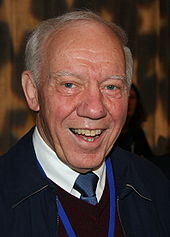 As of last night, Oberstar has fallen to a political newcomer with the typically unusual name of Cravaack (“typically unusual” meaning that I think that Minnesota’s 8th district seems to have more than its share of unusual last names).
As of last night, Oberstar has fallen to a political newcomer with the typically unusual name of Cravaack (“typically unusual” meaning that I think that Minnesota’s 8th district seems to have more than its share of unusual last names).
The 8th district is Dylan’s home, the “north country.” It’s greater Duluth. It’s the Boundary Waters – which Oberstar made into a National Park, I believe. It’s Lake Superior, and the Iron Range, and rough, left-leaning Finns on snowmobiles. It’s some of what I most love about Minnesota. And now it’s gone and tea-bagged itself, for all the world to see. Lovely. What’s become of what was once the nearly socialist character of rural Minnesota? It’s been Bachmannated and now Cravaacked beyond recognition.
Feeling pretty pleased about being an expat.
Below: a picture I took in Duluth, last year, during my back-in-the-USA-but-only-temporarily tour; looking northwest toward downtown, from “the Point.”

